REGIONAL AIRPORTS





January is often a time of optimism in the business world as we emerge from the Christmas break, recharged and full of fresh new ideas.
This year, however, presents many challenges on the domestic and international front for companies in the South East, and a pragmatic and thoughtout approach has never been more important.
Anyone who has had to work on a budget this year will have been faced with the challenge of filling the gap caused by increased in National Insurance Contributions (NIC).
The only options are to raise prices, cut staff or freeze recruitment.
It is clear from a report from KPMG and the Recruitment and Employers Confederation that many companies are opting for the latter.
Demand for staff in the UK was the weakest for four years in November as Budget tax increases spread gloom over the pre-Christmas jobs market.
The survey, which published the monthly report in December, found a drop in its vacancies index, from 46.1 to 43.9, pointing to the sharpest contraction in job openings since August 2020.

Interest rates remain at a stubbornly high 4.75 per cent with a reduction needed to encourage growth in investment.
This reduction, however, will only come with a drop in inflation whose downward trajectory could be derailed by the imposition of import tariffs from returning US President Donald Trump, and the continuing uncertainty in the Middle East which could adversely affect oil prices.
When faced with such uncertainty, a pragmatic approach is needed, and readers should take inspiration from Ocean Partners which is now the biggest privately-owned company in the Thames Valley by turnover following the takeover over of Westcoast by Swiss IT distributor ALSO.
We spoke to Neil Poulter, Vice President of Finance at the Maidenhead global metal trading firm, about how his organisation has reinvented itself continually to match market conditions.
Any employer grappling with increased NIC costs would benefit from reading our roundtable report on employee benefits.
Salary sacrifice schemes can benefit employers by reducing costs paid in NIC because their contribution is calculated based on the employee’s gross salary after the salary sacrifice deduction.
Stephen Emerson Managing Editor stephen.emerson@thebusinessmagazine.co.uk
In this issue we also look at the opportunities to share wealth across the UK through investing in our regional airports.
We interview Lenny Brown, Managing Director of Airbus Helicopters in the UK, and discover the aviation giant’s plans following the opening of its new multimillion-pound facility at Oxford Airport.
We also take a deep dive into apprenticeships in light of the government’s planned shake-up of the apprenticeship levy.
Here’s to a stable and successful 2025.













As the World’s oldest commissioned warship, HMS Victory is best known as where Admiral Horatio Nelson met his maker at the Battle of Trafalgar on October 21, 1805.
The British Navy won the battle, part of the Napoleonic Wars, but Horatio died. His crew took 15 days to sail the the badly-damaged HMS Victory home to England to undergo major repairs.
200 years later and she’s undergoing another mammoth revamp. This time it’s taking £45 million and 15 years at Portsmouth’s historic dockyard.
The conservation team began work on her hull in 2022, erecting scaffolding around the ship to allow her to dry out – Victory is now drier than at any time in her 250-year-plus history – and for work to be carried out in all weathers.
Over the last few years, hundreds of businesses, including conservators, scientists and other experts have
become involved in the project, often combining historic techniques and artificial intelligence (AI).
Archaeologists have taken more than 3,000 images to produce multiple 3D digital models of the ship.
Previously, these images had to be sorted and analysed manually, a timeconsuming task. Now AI has automated this process.
The National Museum of the Royal Navy has said that working on incredibly high resolution, complex images this project is at the forefront of AI usage in archaeology.
The latest company to become involved is Oxfordshire-based Ridge and Partners.
The consultancy has been appointed by the National Museum of the Royal Navy (NMRN) to provide construction design and management on the project.
The aim of HMS Victory: The Big Repair Project is to deliver a fully conserved ship, able to survive in an open environment for the next 50 years without major work beyond a programme of planned maintenance.
Ridge has been appointed to act as specialist Health & Safety Advisor, ensuring NMRN complies with all current and emerging statutory and regulatory requirements in its capacity as Principal Designer and Contractor.
Chris Handley, Ridge Health & Safety Partner, said: “It is an honour and a privilege, having served in the Royal Navy, to have the opportunity to assist the conservation of the world-famous HMS Victory, which is an exceptionally beautiful icon of British naval tradition.
“With former members of the Royal Navy and wider armed forces in our business, Ridge is delighted to have the chance to contribute to this vital heritage project.

Measurable.energy, which is making AI-powered plug sockets to help cut electricity costs and carbon emissions in offices, has secured a £4 million investment.
The funding will accelerate the Reading-based company’s growth at home and overseas – especially in Southeast Asia.
Measurable.energy’s smart sockets tackle energy drain from small devices – appliances that remain plugged in and running even when they’re not in use.
In offices, plug power accounts for up to 40 per cent of total electricity usage, and around half of it gets wasted.
The company’s main business lies within the construction and commercial real estate sectors, with growing demand from the public sector, hospitality, university campuses and NHS hospitals.
It’s signed major deals with Balfour Beatty, Vinci, Morgan Sindall and PKF Francis Clark, and held its last fundraise in January 2023, securing £4.5 million.
This latest round was co-led by Clean Growth Fund, a venture capital firm focused on clean tech, and Vertex Exploratory Fund, an arm of Vertex Holdings.
Dan Williams, co-founder and CEO of Measurable.energy, added: “This investment reflects the confidence in our proven AI-powered technology, which has already made a real impact for businesses across the UK.”
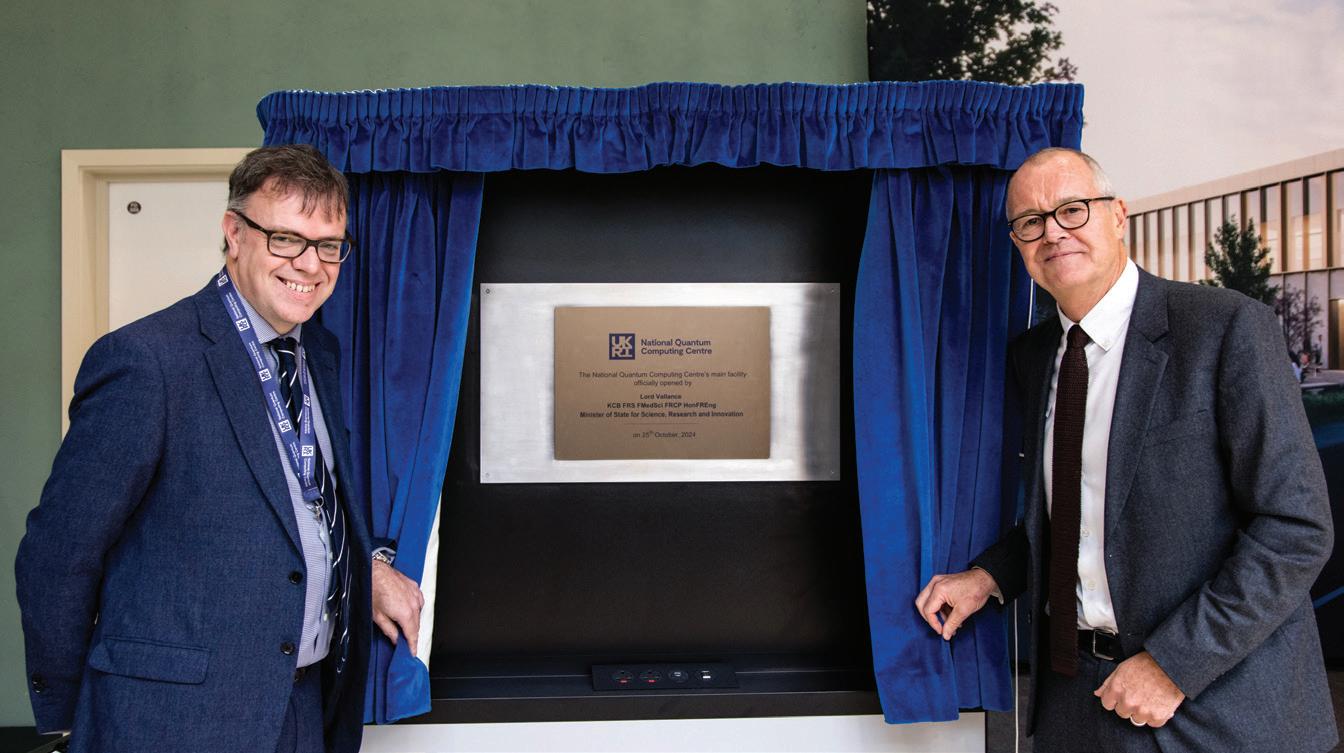
new
The 4,000 sq ft National Quantum Computing Centre (NQCC) is kitted out with 12 quantum computers and will host 70 staff, bringing together businesses, academics and government.
It’s also set to support the world’s first dedicated quantum apprenticeship programme, as well as 30 PhD studentships, summer placements and crash courses for those in industry.
Quantum technologies have wideranging applications across sectors, with potential to create a more efficient NHS, enhanced cybersecurity and stronger digital infrastructure.
And the UK is at the forefront of that push, boasting the second-largest quantum sector globally with significant private investment behind it.
The newly-opened NQCC will leverage quantum computing to optimise the UK’s energy grid, speed up drug discovery, improve climate prediction and make advancements in AI.
Science minister Lord Vallance visited Harwell Campus for the opening. He said: “By making its facilities available to users from across industry and academia, and with its focus on making quantum

computers practically useable at scale, this centre will help solve some of the biggest challenges we face.”
The centre will play a key role in the government’s 10-year quantum programme.
iI’s supported by an initial £93 million investment via the UK Research and Innovation Engineering and Physical Sciences Research Council and the Science and Technology Facilities Council.
UK Research and Innovation has also invested a further £50 million.

What began as a fanciful conversation over the family dinner table has, in just three years, grown to become the biggest event for trading card collectors on the continent.
Harry Reynolds and his sister Katie Hughes welcomed more than 6,000 visitors last November to the 14th London Card Show, held at Sandown Park Racecourse, Surrey.
The show hosted celebrity enthusiasts like England football legend Paul Merson and voice actor Tara Sands, who played Bulbasaur in the Pokémon animated series.
Among the showpieces for the event was a one-in-a-million Wolverine card which experts have valued at more than £100,000… and those kinds of eye-popping prices are hardly an anomaly.
“Cards and collectibles offer a more affordable entry point for younger investors compared to traditional luxury items like art or watches,” said Harry, founder and CEO of the London Card Show. “It’s now an investment opportunity that people of all ages are exploring.”
For Harry and Katie, though, it’s always been driven by passion first and foremost. Their first show attracted just 40 guests, with mum handling the front desk, sister
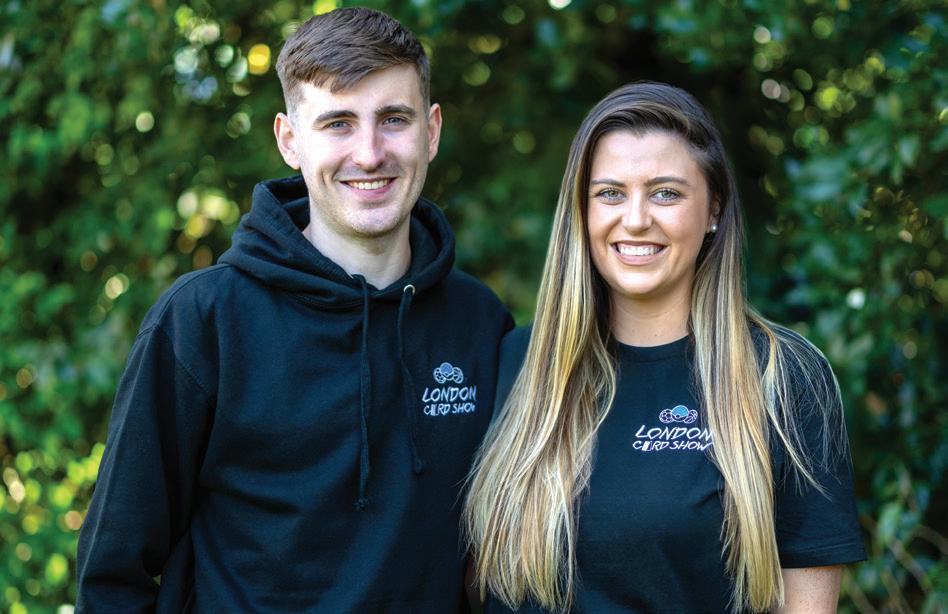
Lucy manning the tuck shop and merchandise store, and grandparents setting up tables.
When the idea first came up, Katie laughed it off as a joke.
“But then I realised it was coming at the perfect time,” she recalled.
“When the interest grew, we continued to expand the upcoming shows in terms of size and immersive elements.”
Harry added: “Our bond as siblings and business partners has been key to our success. We’re fortunate to love what we do, which makes it all the more rewarding.”
The London Card Show will hold another four events this year, with the next scheduled for February.
Hampshire Fare, the organisation for food and drink producers and suppliers, has new corporate partnerships with Powder Monkey Brewing Co and the Lexus Hedge End dealership of Snows Motor Group.
Operating from a former naval gunpowder store in Gosport, Powder Monkey brews pale ales, porters and stouts.
It’s also broken into the Australian market, having bought Southern Highlands Brewing Co in New South Wales, and Willie the Boatman brewery in Sydney.
But the team are staying true to Hampshire. “Having been Hampshire Fare members from our launch, we’ve built a strong relationship with the team,” said Andy Burdon, Powder Monkey’s CEO.
“To become corporate partners as we’re growing makes perfect sense.”
It doesn’t produce food or drink, but that’s not stopped Snows Motor Group –ranked seventh on this year’s Solent 250 – becoming a Hampshire Fare partner.
It operates 56 dealerships across the South, including in its home county of Hampshire. Its Lexus Hedge End dealership team are supporting Hampshire Fare activities.
“Snows might be quite a large organisation, but like Hampshire Fare, we believe in the value of local,” said Bruce Simpson, general manager at Lexus Hedge End.
Natasha Dochniak, Commercial Manager at Hampshire Fare, added: “Corporate

partners contribute financially and strategically, allowing Hampshire Fare to invest in new projects, marketing campaigns and events.
“Food and drink tastes better when it’s been made with passion, and it feels more special when we know the people and the stories behind the produce.”


Heathrow, Gatwick and Manchester are flying millions of commuters and cargo all over the globe. They are supported by a critical aviation eco-system at our regional airports
By Nicky Godding, editor
Air travel powers our economy. It supports the UK’s vibrant tourism industry, helps businesses access new markets, creates jobs and – particularly in the case of regional airports, helps to spread the economic benefit out of the UK’s biggest urban centres.
Now new analysis commissioned by AirportsUK, the airport operators’ association, shows that UK airports are
collectively worth more than £53 billion of gross added value (GVA) to our economy, while a further £95.6 billion of the nation’s GVA depends on air freight exports.
Investors see this. Last November AGS Airports, which runs Aberdeen, Glasgow and Southampton airports, was sold to AviAlliance, one of the world’s leading private industrial airport investors and managers, in a deal said to be valued at more than £1.5 billion. Then it was reported that Birmingham, Bristol and London City airports were up for sale by
Canadian pension fund owner The Ontario Teachers’ Pension Plan.
In the third quarter of last year, UK airports experienced a surge in passenger activity, surpassing pre-pandemic levels. Aviation analytics firm Cirium revealed that more than 51 million passengers departed from UK airports on 282,775 flights.
Airports are a vital part of our transport infrastructure and while the big ones get the headlines, the value of our regional airports shouldn’t be underestimated.

Last year the government announced it would undertake “the biggest shake up to airspace design in 70 years”.
It wants to modernise UK airspace and a team of aviation experts is working with our airports to improve the way planes fly in, out and over the UK.
Upgrading the “highways of the sky” could reduce delays, emissions and noise pollution – and deliver important economic growth.
... little credit is often given to the important, even critical role that our

While most focus is generally aimed at our largest civil airports, such as Heathrow, Gatwick and the largest regional ones such as Bristol and Birmingham, credit isn’t often given to the important, even critical role that our regional, general aviation airports play.
My interview later in this feature with Andrew Bell, the CEO of Regional and City Airports which owns and operates five UK airports, shows they are home to hundreds of businesses, including pilot training schools, aircraft maintenance companies, cargo and logistics businesses.
Many businesses locate on an airport business park simply because they have great road and communications infrastructure and are well maintained.
And there is still lots of commercial space capacity at most regional airports, which supports regional prosperity and local employment.
The majority of approved pilot training academies are based at regional airports such as Farnborough, Gloucestershire, Oxford and Coventry.
With UK aerospace companies investing billions of pounds in decarbonising flight (the number one challenge for an industry which is one of the UK’s biggest success stories), a lot of research and development to achieve this takes place at regional airports.
Bristol-headquartered Vertical Aerospace is pioneering zero emissions aviation and conducts prototype testing at Cotswold Airport in Gloucestershire, as does ZeroAvia which is developing a hydrogenelectric aircraft.
Much of the UK’s current airspace was designed in the 1950s when there were
fewer flights, and aircraft navigated using
Advanced navigation technologies will allow the UK Airspace Design Service to plan a better use of UK airspace.
If an aircraft can fly more efficiently between points and with fewer delays it will burn less fuel and create less noise while adding more capacity.
And all regional airports are investing heavily in decarbonisation. Surprisingly it’s no longer an airport building which emits the most carbon dioxide, but the airfield equipment used to handle the aeroplanes, passengers and cargo, and many regional airports are already successfully decarbonising this area of operations.
Opportunities abound for our regional airports.
Until November last year
Southampton Airport was owned by AGS Airports which also owned Aberdeen and Glasgow airports. All three have been snapped up by AviAlliance, a wholly-owned airport operating platform run by the Public Sector Pension Investment Board (PSP Investments) of Canada.
In 2023, Southampton handled more than 764,900 passengers. The airport supports passenger flights, cargo, general aviation, air ambulance, military and training flights. It also supports 10 airlines and flies to destinations across the UK and internationally.
The airport is operated by Regional & City Airports (RCA) part of Rigby Group plc.
In the 12 months to the end of March 2024, it served 967,000 passengers, a 25 per cent increase on the previous year and surpassed pre-pandemic levels.
The Thames Valley area’s main regional and business aviation airport – the only commercial airport between London Heathrow and Birmingham.
It’s owned by Omaha Business Holdings, part of the Reuben Brothers Group of businesses. The airport sees around 50,000 aircraft movements a year of which 5,000 are private business aviation while the majority of the rest are professional pilot training flights, a sector of the aviation industry for which the airport is best known globally. The airport consists of nearly 600 acres of freehold land and provides more than 300,000 sq ft of hangar space, as well as substantial office, workshop and accommodation space within its numerous buildings. 4 3 4
The airport is planning to expand its terminal, parking, taxiways, aircraft stands, immigration and baggage facilities. It is also planning to build 900 new parking spaces in addition to its current 2,600 spaces.
Farnborough Airport’s aim is to be the world’s leading business aviation airport.
Activities include airfield operations, passenger and aircraft handling services, hangars for contract and transient aircraft parking, as well as real estate facilities including an on-site hotel - the Aviator Hampshire.
HERTFORDSHIRE
A study published last July revealed that business aviation flights from Farnborough contribute £1.9 billion of Gross Value Added to the UK economy every year.
Last year the airport opened Domus III, a 175,000 sq ft hangar at the airport. increasing the airport’s overall hangar capacity by more than 70 per cent. The project was one of the largest private inward investments into the local area for many years. It has also recently invested £2 million in a rooftop solar farm to meet around 25 per cent of its electricity needs and reduce controllable emissions, and has more expansion and improvement plans in the pipeline.
MIDDLESEX
SURREY
Brighton City Airport (formerly known as Shoreham Airport) is one of the world’s oldest commercial airports. Today, the airfield is a major centre for pilot training, pleasure flights, private jet and helicopter charters. 5 2 5
You can fly from your local airport, but so much more goes on there which supports the entire aviation industry
By Nicky Godding,
editor
The clue is in the name – Regional and City Airports is a leading regional airport operator. It owns Bournemouth, Coventry, Exeter and Norwich airports and operates Solent Airport on behalf of Fareham District Council.
Sitting at the helm of Regional and City Airports (RCA) for nearly a decade is experienced airport director, Andrew Bell, the company’s Chief Executive.
“Regional airports matter,” he said. “As transport hubs they provide a great passenger experience and connectivity, but that’s only one aspect of their importance to the UK’s wider aviation sector.
“The role regional airports play in the UK economy has become increasingly important. With new airport infrastructure increasingly difficult to develop, we need to use the considerable resources these smaller airports offer to meet growing demand, drive innovation and achieve our ambitions for net zero aviation.
“Heathrow sits at the pinnacle of the UK’s

air passenger eco-system,” he explained. “As a global flight transport hub, it has all the infrastructure to ensure that passengers enjoy a great experience.
“But for every journey made, the plane will have been maintained, its engines serviced, cabin interiors designed, fitted out and upgraded numerous times over the life of the aircraft. The pilots will have been trained, along with the air traffic controllers, engineers, cabin crew and so on.
“And much of that goes on quietly at regional airports where there are pilot training schools, and smaller air traffic control towers where the teams can build their experience before moving to one of the UK’s bigger and busier hubs.
“There are also dozens of businesses which use the millions of square feet of commercial space available at most regional airports – from engineering to manufacturing to logistics and more that support every aircraft which takes off and lands every day across the UK.”

The biggest challenge for the aviation industry is to achieve decarbonisation. This needs to happen as soon as possible and everyone broadly agrees that it can be done – probably by 2050, or even earlier.
“Aviation can be net zero and operate an absolute zero carbon environment,” said Andrew.
Regional airports are playing a major part in helping to drive progress in this area. RCA sells sustainable aviation fuel (SAF) at its Norwich airport and is hoping to make it available at its others.
Why isn’t SAF available at all RCA’s airports? “There’s not enough of it available,” said Andrew.
“This speaks to a bigger point around the work going into creating new fuels out of carbon dioxide and hydrogen, which don’t need oils or fats or crops (which make up most current sustainable aviation fuels).
“Aviation can be net zero and operate an absolute zero carbon environment”

“It’s a massive challenge but there’s a huge opportunity for those who succeed in creating these fuels,” he added.
“Some regional airports host trials of new technology such as providing testbeds for new forms of sustainable aviation fuel, electric and hydrogen-powered flight,” said Andrew.
“They have the infrastructure to support technological progress safely – because you can’t trial innovative new forms of propulsion at a busy hub airport.”
And it’s not just hosting trials for sustainable fuels. “There’s a lot more we can do as a provider of airport infrastructure.
“Ensuring our buildings are low carbon, or net zero is one thing and we now only use green energy, but the strategy for our airports themselves is to be completely net zero by 2040 – or even earlier.”
For most airports now, the biggest emitters of carbon dioxide are no longer the buildings, but the equipment used on the airfields to handle the aeroplanes,
passengers and so on and RCA is playing its part here.
At Exeter, the airport operator is trialling hydrogen-fuelled ground support equipment which it hopes will significantly reduce carbon emissions from its operations.
The initiative is part of the ‘Zero Carbon Turn’ project involving RCA, global travel company TUI and Cranfield University.
The trial includes the safe supply, storage and delivery of hydrogen for ground support equipment. It will also help develop airport-specific standards and regulations, identify necessary skills and training, and establish a pathway for converting ground support equipment to hydrogen power.
But progress is necessarily slow.
“We are heavily regulated by the Civil Aviation Authority on behalf of the government. Introducing any new piece of equipment, fuel or procedure must be tried and tested because safety is paramount, for obvious reasons,” explained Andrew.
“If we want to introduce a new fuel source, such as hydrogen, into an airside environment where there are people, aviation fuel and aeroplanes taking off and landing, our regulators will say there’s no manual for that, so we have to write one.
“But when we’ve done that and it’s been approved, we can share it with other airport operators. It’s all about creating a new pathway for everyone to follow.”
RCA is also part of the Airport Carbon Accreditation Scheme (ACAS), owned and governed by ACI Europe, which represents more than 500 airports in 46 European countries.
ACAS is a global carbon management certification programme for airports. It independently assesses and recognises the efforts of airports to manage and reduce their carbon emissions through seven levels of certification.
“We are at level two and while I would like it to roll quicker, we are making progress and the further up the ladder we get, the more we learn,” said Andrew.
Instead of focusing only on expanding major airports, we should also be looking at how regional airports can make a greater contribution to the UK economy
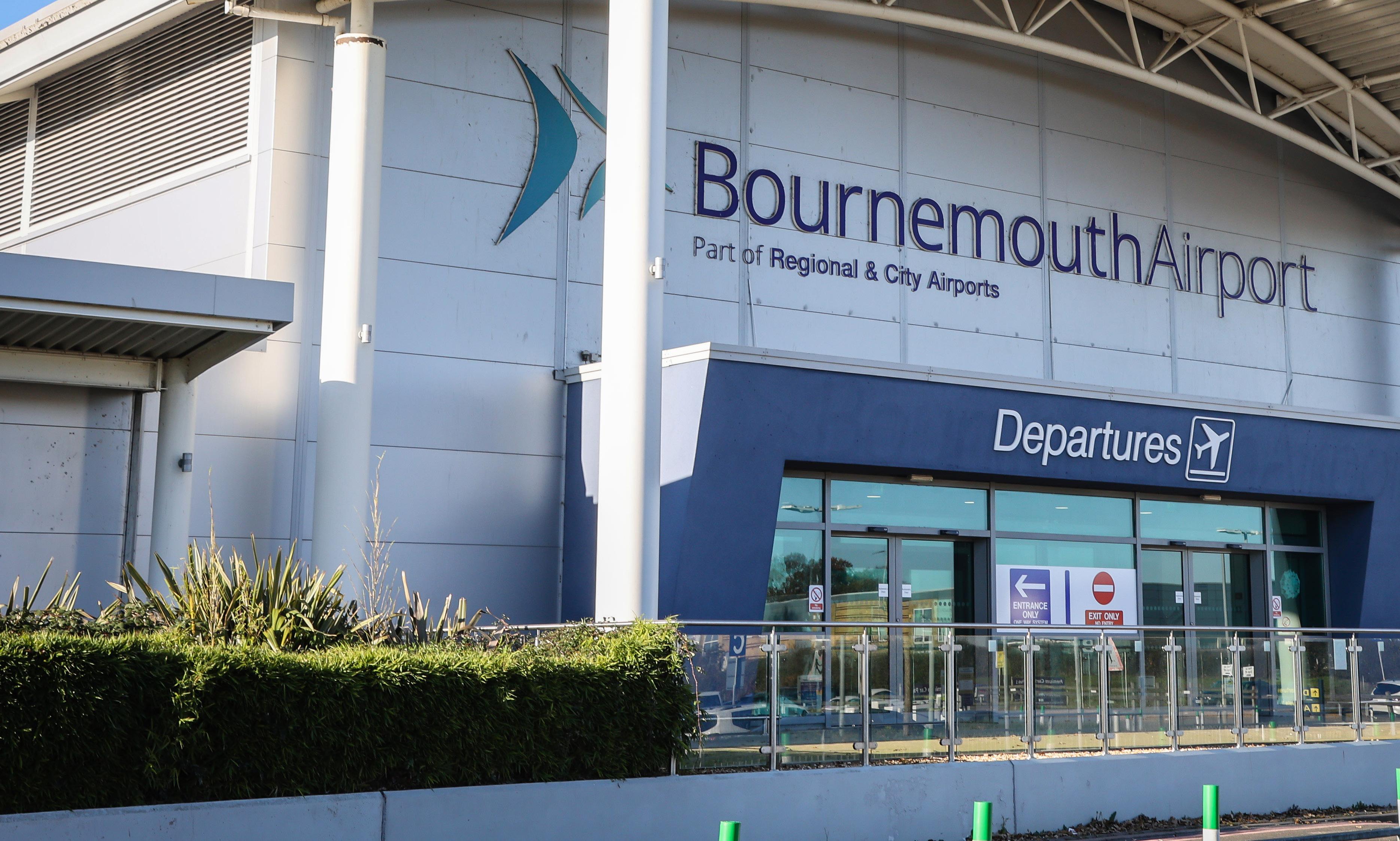
The logistics sector is increasingly working through regional airports. There’s a reason for this: commercial rents are often lower than at the UK’s biggest airports, but they still benefit from good road and other transport infrastructure.
A key reason for using airfreight rather than shipping across the globe is that the goods get there a lot quicker, meeting ever-growing consumer demand. Who wants to wait three weeks for something bought off Amazon?
RCA’s Bournemouth Airport now provides the UK’s newest cargo gateway, offering a unique full-service cargo operation and it is already looking to expand its facilities to meet a growing demand.
Using a huge hub such as Heathrow or Gatwick often means that the transition from airplane into the logistics supply chain is slow and expensive, undermining the very reason for using air freight in the first place.
“Regional airports can often manage airfreight faster, more efficiently and cost effectively,” said Andrew.
RCA has around £130 million worth of commercial property across its five airports. “We have space airside and landside and occupiers representing a range of industries, from aircraft maintenance to logistics and many other businesses,” said Andrew.
“Many of them are related to the aviation sector, others simply choose to be based at an airport business park because it’s well located, and the infrastructure is good.
There is also development potential for a further two million sq ft of commercial space across the RCA estate alone, Andrew said.
At Coventry, there is potential for something which will change the face of the city’s airport for ever – the development of a gigafactory.
The proposed West Midlands Gigafactory is a unique venture between Regional and City Airports owner The Rigby Group and Coventry City Council. It is also supported by an alliance of West Midlands industrial groups, local government and academic institutions.

This is a long-term project, but it has recently secured £2 million in government funding for planning the necessary infrastructure works.
Collectively, RCA’s five airports contribute hundreds of millions of pounds to the UK economy, and each of them are deeply embedded in their local regions, providing employment and supporting hundreds of businesses.
“Instead of focusing only on expanding major airports, we should also be looking

at how regional airports can make a greater contribution to the UK economy,” said Andrew.
“These airports, many privately owned and operating within a competitive free-market economy, have the infrastructure and space for years of continued growth.”
The Bournemouth Airport campus, which includes a business park, is under the ownership and management of RCA. It is the largest employer in Dorset with 4,000 jobs on site across more than 130 businesses. Along with the port in Poole, it is recognised as the future engine of the regional economy.
“We are investing around £60 million in the airport, across cargo and passenger facilities and airport infrastructure. It’s our biggest airport project to date,” said Andrew.
“Bournemouth’s been a great success story in terms of growth. It was the fastest growing airport relative to 2019 last year, recovering rapidly from the pandemic. This year it will handle about 35,000 tons of cargo, which puts it comfortably in the top 10 UK airports for handling cargo. In February we will welcome Jet2.com, with a 20-route network available from Bournemouth. That’s huge for us.”

Aviation is evolving fast and passenger numbers are rising.
Regional and City Airports wants to drive progress in helping to train a new generation of engineers, technicians and pilots.
It is collaborating with institutions such as the Future Skills Centre in Exeter and the International Aviation Academy in Norwich to ensure the next generation of aviation professionals have the right skills to operate, manage and maintain the new technologies.
It wants to position its regional airports as centres of innovation and employment.
The UK aviation industry is at a critical point, said Andrew.
“Passenger numbers returned strongly after the pandemic and are projected to grow steadily over the coming decades.
“With pressure on the larger airports intensifying, regional airports can help meet increasing demand and spread the beneficial economic effect across the whole country.”
Regional and City Airports is owned by The Rigby Group, Europe’s largest private technology company and investor, and a multi-generational family business. Based in Stratford-upon-Avon, in 2023 it reported an annual turnover of almost £4 billion.

AviAlliance, one of the world’s leading private airport investors and operators, has acquired Southampton Airport in part of a £1.53 billion three airport deal to buy AGS Airports from Ferrovial and Macquarie.
AGS Airports, established in 2014, operates Aberdeen, Glasgow, and Southampton airports. AviAlliance says it will leverage its extensive global airport expertise to responsibly develop AGS Airports, enhancing air connectivity, improve the passenger experience and support local communities.
AviAlliance is the wholly-owned airports platform of the Public Sector Pension Investment Board (PSP Investments), one of Canada’s largest pension investors.
Founded in 1997 and acquired by PSP Investments in 2013, it has a long track record of traffic growth, operational excellence and passenger experience as well as investment in its airports.
Gerhard Schroeder, Managing Director of AviAlliance, said: “Aberdeen, Glasgow and Southampton airports provide vital connectivity for communities in Scotland and the South East of England.
“As a seasoned airport investor and manager with in-depth industry expertise, AviAlliance will enable each airport to realise their full potential.
“We are committed to supporting the airports over the long term to expand
Last summer, OXCCU, which converts carbon dioxide into fuels, chemicals and plastics, launched its first official demonstration plant at Oxford Airport.
The OX1 plant represents a significant advancement in Sustainable Aviation Fuel (SAF) production. Through its novel catalyst and reactor design, the plant will convert carbon dioxide and hydrogen directly to long-chain hydrocarbons with high conversion and selectivity for use as SAF, which it has named OXEFUEL.
The facility, will produce 1 kg of liquid fuel per day.
The plant will also be the world’s first demonstration of the direct conversion
their route networks, further improve the passenger experience and implement the airports’ sustainability strategy.”
Andy Cliffe, Chief Executive Officer of AGS Airports, said: “Over the past 10 years, Macquarie and Ferrovial have played a central role in unlocking our full potential. Their partnership with the teams across our three airports ensured we had the support to invest in our passenger offering while improving our operations.
“We are grateful for their close stewardship and look forward to continuing to develop our services and beneficial impact on passengers and communities across the regions of Aberdeen, Glasgow and Southampton.”

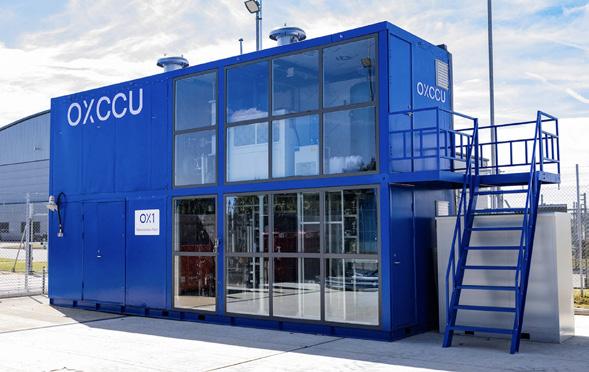
of CO2 and H2 to jet fuel range hydrocarbons in a single step with minimal oxygenated byproducts using OXCCU’s novel catalyst.
In October, the company joined the RISE coalition in support of the Back British SAF campaign.
This industry-wide initiative urges the government to fast-track the SAF Revenue Support Mechanism Bill to
ensure the UK meets its target of having five SAF plants under construction by 2025.
Andrew Symes, OXCCU Co-Founder and CEO, said: “Establishing a robust SAF industry in the UK is crucial to securing our energy independence and leadership in sustainable aviation. Working with industry partners, we can scale up SAF production and ensure the UK stays competitive in the transition to net zero.

A study published late last year revealed that business aviation flights from Farnborough Airport, one of Europe’s leading airports for premium air travel, contribute £1.9 billion of Gross Value Added (GVA) to the UK economy every year.
The report published by CBI Economics and entitled Getting Business Going – The economic benefits to UK plc of business aviation at Farnborough Airport also revealed that the equivalent of 23,000 full-time equivalent jobs result from the economic activity created by the airport.
As the largest dedicated business aviation airport in the UK, Farnborough Airport plays an important role in supporting this economically valuable air travel market, which is increasingly being displaced from larger commercial passenger airports as they look to prioritise bigger aircraft in a capacity constrained London and SouthEast airports network.
The CBI Economics study also found that approximately 80 per cent of the flying activity from Farnborough Airport related either directly or indirectly to supporting UK business and inward investment.
These latest figures come on the back of an updated economic assessment undertaken in 2023 by York Aviation, which was submitted to Rushmoor Borough Council as part of the Airport’s planning application to increase its annual flights from 50,000 to70,000.

This found that the localised economic impact of Farnborough Airport supported 2,600 jobs and injected £170 million of GVA into the local economy each year.
Simon Geere, CEO at Farnborough Airport said: “These findings from CBI Economics support what we have been saying for some time, that the role of business aviation in driving inward investment and creating economic opportunity within the UK is both significant and demonstrable.
“Farnborough Airport in particular, with its well-invested infrastructure and available runway capacity, has a critical role to play in supporting economic growth, at a local level and across the wider UK.
“With Farnborough Airport serving smaller, lighter aircraft, our environmental footprint is a fraction of that of a traditional commercial passenger airport, yet our economic output relative to our size is completely unsurpassed. We are hugely proud of the local and national economic
success story of which Farnborough Airport has clearly become.”
Louise Hellem, Chief Economist at CBI Economics said: “It is striking the impact that the business aviation sector has on the UK economy, in particular the economic opportunity it creates and the importance of the sector in driving UK competitiveness and growth.”
In November, the airport completed one of the largest light weight solar installations in the South East, enabling the airport to generate 25 per cent of its own power.
The project saw more than 4,000 solar panels mounted on Farnborough Airport’s iconic curved hangar roofs, as well as its terminal building, the airport’s control tower and its 169 room hotel, the Aviator Hampshire.
The installation will enable the airport’s operational fleet of electric vehicles to be charged using self-generated electricity.
REGIONAL FOCUS
THAMES VALLEY

by Daniel Face, Senior Reporter
Opened in 2017 as part of the £240 million development of Bracknell town centre, The Lexicon shopping centre has grown to rival the retail offering of nearby Reading, and it’s just gained three more retail brands.
Levi’s opened its new 3,885 sq ft outlet at The Lexicon in October, while Tesco Express has secured a 2,599 sq ft space next to Starbucks.
Home furnishing retailer Dunelm will be occupying 15,000 sq ft in a new flagship letting for Princess Square, which falls within the centre.
These latest deals follow the arrival of national bar and cafe chain Lounges and dessert brand Amorino earlier in the year.
Anchor tenants Marks & Spencer and department store Fenwick
were soon joined by the likes of H&M, Costa and The Body Shop which maintained its Bracknell storefront through administration last February (more on that in our Surrey, Sussex and Kent roundup in this issue).
The centre, a joint venture between Schroders Capital and Legal & General Capital, is now home more than 160 retailers.
“We expect these retailers to prove popular with customers as we capitalise on the strong footfall and sales during the first half of 2023,” said Tom Woolven, Schroders Capital asset manager.
“With The Lexicon now approaching full occupancy, ourdiverse tenant mix which provides a wide array of choice in the postpandemic retail landscape.
“It’s testament to the strength of Bracknell as a retail destination that that we continue to welcome high profile brands and new flagship tenants to the scheme.”

Station Hill, the £850 million mixed-use development just behind Thames Tower office block is now complete.
With it have come two new retail lettings from Japanese restaurant Kawaii and coffee roasters and bar chain Notes.
Kawaii, an offshoot of the popular Osaka restaurant at the nearby Oracle shopping centre, has signed a 15-year lease for a unit on the ground floor at Station Hill.
The space will be converted into a contemporary diner with outdoor seating, offering traditional Japanese dishes with a modern twist – and crockery imported from Japan to boot.
Notes is the more established brand of the two, operating 12 outlets across London as well as its own roastery.
In its first venture beyond the capital, Notes has signed a 10-year lease to set up a bar for wines, cocktails, seasonal food – and of course a range of specialty coffees.
They join the likes of PepsiCo, PwC and flexible working provider NewFlex, which were announced last June as the first wave of occupiers at Station Hill.
The development is a joint venture between Lincoln Property Company and MGT Investment Management.
“From the outset, our approach to retail leasing has been twofold,” said Evan Reynolds, development director at Lincoln.
“First, to target local heroes, ensuring that Station Hill celebrates Reading and avoids becoming just another identikit development filled with national chains.
“And second, to attract outstanding independents from London to Reading.
“These two new leases exemplify that strategy and will form the cornerstone to our placemaking and events strategy, which we’re excited to roll out this year.”

Reading-based content management business Proventeq, which also has offices in the US, UAE and India, has secured a multimillion pound sum from capital investor BGF.
Established in 2007 and still owned by its three founding shareholders – Chief Executive Nitin Mahajan, Chief Technical Officer Rakesh Chenchery, and Chief Commercial Officer Balu Herbert – the firm sells to clients in more than 30 countries.
This latest investment will help Proventeq expand its offerings in enterprise content management modernisation, intelligent information management and AI-led innovation.
“As companies look to modernise their legacy systems and ensure regulatory compliance, robust data management and governance become essential,” said Nitin.
“Our goal is to help organisations establish strong foundations with secure and modernised data platforms, enabling them to harness the power of AI and automation.
“With significant opportunities in the market, we’re delighted to partner with BGF as we expand and further develop our proposition.”
Tim Wallis, former CEO of Microsoft partner and SharePoint consultancy Content and Code, will join the Proventeq board as non-executive chair.
“We’re excited to welcome Tim aboard at this stage of our growth,” Nitin added.
“He’s well-respected within the industry and his knowledge of building a digital transformation consultancy is second to none.”
The investment was led by Guy Pope, an investor at BGF’s Reading office, with support from Harry Kernick, Georgie Stratton and Alex Garfitt.
“With more focus than ever on AI and compliance globally, there’s a critical need for experienced tech-enabled consultancies in this area,” said Guy.
“Proventeq is an exciting tech business operating in a market with strong growth dynamics.”

The new owners behind Wycombe Film Studios look keen to safeguard against industry turbulence as they float proposals for a data centre.
Credit manager SCIO Capital acquired the venue via a subsidiary last April after Studio Fifty, which also ran Farnborough and Winnersh Film Studios, fell into administration.
The collapse was blamed on cashflow problems in the wake of Hollywood’s writer and actor strikes, which spilled into the UK film sector.
Keen to avoid the same fate, the studio is now seeking outline planning permission to build at least one data centre on land south of Wycombe Air Park, home to
After 10 years building and managing specialist recruitment teams in London, entrepreneur Adam Moore has returned to Bracknell to launch his own consultancy.
Morela Solutions will focus primarily on the change and transformation market, dealing in technologies like generative AI, enterprise resouce planning and other cloud-focused solutions.
The recruitment start-up has already begun building a team, with Adam keen to provide local upskilling opportunities in his hometown.
“Although the hustle and bustle of London encapsulated me for many years, I always planned to return to the area,” he said.
eight sound stages plus workshops and production offices.
Data centres play a key role in the storage, processing and distribution of video and digital assets in modern film production – but the studio is keen to capitalise on wider market demand.
It has pledged to meet “high sustainability standards, including the use of renewable sources of energy where feasible” and achieve a 10 per cent net gain in biodiversity through the development.
Separate to the proposal, the council gave the go-ahead in November for five temporary workshops and a temporary backlot at Wycombe Air Park, ready for filming this April.

“With the recent rejuvenation project giving Bracknell an exciting new energy, the prospect of opening a business in the area created a huge sense of drive in me.
“I’m very positive about the trajectory of the business.”
Morela has also garnered the backing of Birmingham-based recruitment group VIQU, led by Matt Collingwood.
“Just weeks after launching, Adam has had a number of small wins,” said Matt.
The £16.5 billion merger of telecoms giants - Newbury-based Vodafone and Three - has been approved by watchdog, the Competition and Markets Authority (CMA).
It comes after 18 months of analysis by the regulator, with the tie-up poised to create the UK’s biggest mobile network with 27 million customers.
The watchdog had previously concluded that the mega deal could lead to price increases for tens of millions of mobile customers or see them get a reduced service.
It had also provisionally found that it would negatively impact ‘wholesale’ telecoms customersMobile Virtual Network Operators (MVNOs) such as Lyca Mobile, Sky Mobile and Lebara - which rely on the existing network operators to provide their own mobile services.
But now the merger can go ahead, said the CMA, as long as both companies agree to invest billions to roll out a combined 5G network across the UK.

Although all COPs operate at international level and do not produce legislation that directly governs UK businesses, they undeniably influence the legislative and policy agendas for trade in the participating countries. Here are the top takeaways for businesses from COP veteran and commentator Simon Carroll, a dispute resolution and environment partner at B P Collins LLP.
COP29, often referred to as “the finance COP,” emphasised the critical role of financial commitments in addressing climate change. Building on the discussions from COP27, which highlighted the need for increased financial support to vulnerable nations, COP29 focused on bridging gaps in climate finance. A key agenda item was advancing the New Collective Quantified Goal (NCQG), which sought to raise global climate finance from the $100 billion per year target established in 2009. The amount was increased to ‘at least’ $300 billion in the final decision with the complement of a ‘Baku to Belém Roadmap of $1.3 trillion,’ for supporting climate action, especially for developing countries.
The Loss and Damage Fund (LDF), a significant achievement from COP28, was established to assist countries disproportionately affected by climate change. Despite a promising start with $420 million pledged, critics have expressed concerns that the fund’s contributions are still insufficient. COP29 pushed for greater clarity and progress on the NCQG, which is anticipated to be finalised by 2025.
Discussions also focused on creating efficient financial mechanisms, such as carbon pricing and trading schemes. These initiatives are designed to make carbonintensive practices economically unviable, thereby incentivising sustainable, climate-
friendly decisions in both government and business sectors. Collaboration between governments and the private sector will be vital to drive these market-based solutions.
International trade, responsible for about a quarter of global emissions, was another key area of focus. COP29 explored how trade can be leveraged to combat the climate crisis by encouraging the provision of environmentally friendly goods, services, and technologies, especially to developing nations. Additionally, environmental metrics could be introduced to shape trade agreements and incentivise sustainable practices, while penalising those that contribute to environmental harm.
Youth involvement at COP29 was significant, as young people continue to express urgency regarding climate action. A survey showed that over 50% of youth feel powerless about climate change, highlighting the need for their voices to be heard in global negotiations. COP29 provided an opportunity for youth to influence discussions on climate education and ESG strategies, which will be critical for businesses seeking to align with the values of younger generations who will inherit the impact of today’s climate decisions.
Gender diversity was a central theme at COP29, following the recognition of its importance in previous COPs. The conference hosted discussions on genderresponsive climate action, with a focus on the “Gender Responsive Just Transitions and Climate Action Partnership,” which aims to empower women in the transition to a low-carbon economy. However, challenges remain, as women still made up only 34% of delegates at COP29. Achieving gender equality in climate discussions will require sustained effort.
Biodiversity is another critical issue, as it plays a vital role in mitigating climate change. Climate change, in turn, threatens biodiversity, with projections indicating a three degrees increase will result in significant habitat loss for many species. COP29 focused on the relationship between climate change and biodiversity, building on the Kunming-Montreal Global Biodiversity Framework established at COP16 which is an agreement between committing nations to halt and reverse nature loss by 2030.
Scan the QR code to listen to the ‘COP29, clean tech innovations, and everyday SMEs’ podcast.

Simon Carroll is a partner in B P Collins LLP’s environment and dispute resolution practices. If you would like to speak to him about a legal matter involving the waste, renewable energy, or environmental sectors, please contact enquiries@bpcollins.co.uk or call 01753 889995.



The Solent 250 is an annual ranking that celebrates the top privately-owned businesses in the region listed by annual sales turnover.
Qualifying companies must be independent and headquartered in the Solent which is defined as Hampshire (south of Basingstoke), parts of Dorset, Wiltshire and West Sussex.
The listing is compiled by The Business Magazine and sponsored by HSBC UK, specialist recruiter CMA Recruitment Group,

law firm Broadfield (prev. BDB Pitmans), wealth, accountancy & advisory firm Evelyn Partners, IT solutions provider Aura Technology and business insurance, risk management and consulting firm, Gallagher
All companies on the ranking will be invited to a private awards dinner in 2025.
If you would like to be considered for an award, or for more information please contact Laura.Clarke@thebusinessmagazine.co.uk

HSBC is once again delighted to continue our longstanding support and sponsorship of the Solent 250. Congratulations to all of the companies that have made the list and it’s great to see the continued success, growth and diversity of the
businesses in the Solent region. We are pleased to welcome the new entrants to the list and look forward to celebrating with all of the Solent 250 companies at the exciting events programme that we have planned for 2025.

As the UK’s leading integrated professional services and wealth management group, we are actively engaged with businesses in the region and privileged to continue to support the Solent 250 businesses through our sponsorship. Well-placed to look after businesses at all stages of their lifecycle, we offer a full range of services along with a unique range of advice to directors and shareholders. We believe



in placing the power of good advice into more hands and have over 180 years of experience in helping businesses flourish. Providing specialist accountancy, assurance, tax and advisory services under one roof to corporate businesses, business owners and individuals, we ensure that business and personal wealth work together.





Broadfield UK (formerly BDB Pitmans) is a law firm that serves mid-market clients, with deep expertise in multiple practice areas and a strong commitment to client service. As trusted advisors navigating the complexities of law, the Broadfield team is comprised of entrepreneurial experts and leaders who provide legal strategies and solutions tailored to meet
the unique needs of each client. With offices currently in London, Cambridge, Reading and Southampton, Broadfield UK has a team of over 420 experts dedicated to building lasting client relationships grounded in trust and integrity. In 2024, Broadfield UK became the founding member firm of Broadfield.

CMA Recruitment Group is a long-term supporter of the Solent 250 and delighted to enter our seventh successive campaign. Established in 1980, CMA is renowned as the south’s leading Accountancy and Finance, Executive and
HR recruitment consultancy. We already work very closely with a number of companies within the Solent 250 and look forward to making new introductions and helping to support even more businesses throughout the region.

Gallagher is one of the world’s largest insurance brokerage, risk management and consulting firms. As a community insurance broker and trusted local consultant, we help people and businesses move forward with confidence. With more than 53,000 people working around the globe, we’re connected to the places where we do business and to every
community we call home. Managing risk with customised solutions and a full spectrum of services, helping you foster a thriving workforce, and always holding ourselves to the highest standards of ethics to help you face every challenge— that’s The Gallagher Way.

Aura Technology is proud to support the Solent 250, celebrating the incredible achievements of local businesses that are driving innovation and growth in the region. As an IT services provider committed to delivering cutting-edge solutions, we understand the crucial role that technology



plays in helping businesses succeed in today’s fast-paced environment. We are excited to be part of this prestigious programme and look forward to working closely with the region’s top companies, helping them achieve new heights through technology.














Back in 2017, Southampton Football Club led the way among Premier League teams in opening a sensory room for supporters to enjoy match days at their own pace.
Now, eight years on, local housebuilder Bargate has spearheaded a complete renovation of the space, as well as funding the installation of specialist sensory equipment.
The new and improved room boasts interactive features like a projector, sound and light panels, LED lighting and soft play.
Mark White, Managing Director of Bargate Homes, said: “As a proud father to a teenage son with additional needs, I’m very pleased to unveil the Bargate Homes Sensory Room.
“This project has been a labour of love, with so many companies and individuals
Stannah, which builds stairlifts and homelifts from its manufacturing base in Andover, has launched a new brand –Uplifts.
Founded and led by Sam Stannah, a sixth-generation member of the family business, Uplifts comprises a range of throughfloor lifts marketed as compact, quiet and energy-efficient.
“We’re really excited to introduce Uplifts to the market,” said Sam.
“Our team has created a product that meets the high standards associated with our family’s engineering and manufacturing legacy, and pushes the boundaries of what’s possible in homelift design.”
The range comes in two sizes – the S2, which can accommodate one or two people standing, and the S3, with room for up to three people or a wheelchair.
Sam added: “As a member of a family with a rich history in the lift industry, I’m incredibly proud to lead this new venture.
“Uplifts embodies our heritage of quality and innovation while looking firmly to the future of home mobility.”
Ranked ninth on this year’s Solent 250, Stannah moved into its 90,000 sq ft facility at Andover Business Park in September 2023.

giving up their own time and resources to make a real difference.
“Special thanks go to Anthony Forfar Carpets and Flooring, Bourntex Ltd, Elliotts Builders Merchants, Granite Kitchen Services Ltd, Lumi-Plugin, Quayside Electrical, Apollo Signs and Tailor Made Kitchens.”
Sensory rooms are often set aside for those with autism or similar disabilities.
But Saints have recognised that other
supporters may benefit from such a space, and so – after feedback from fans – the club now accepts requests for those with dementia, Alzheimer’s and anyone else who’d like to drop in.
“We look forward to seeing our fans benefit from the top-class facility for many years to come,” added Greg Baker, the club’s chief revenue officer.
Bargate Homes is ranked 102nd on the Solent 250, while Southampton FC comes in 28th.
A global sensation, padel has finally cracked the UK. One Hampshire company is leading the charge
by Daniel Face, Senior Reporter

To the uninitiated, padel is the new kid on the block in the world of racquet sports (alongside an American favourite, pickleball). Maybe this is the first you’re hearing of it.
In fact, the game – a mix of tennis and squash, played on enclosed courts and typically in doubles – is thought to have originated in Mexico back in the 1960s. Only in recent years has it gained rapid global traction, with the International Padel Federation estimating that there are now 30 million players and 63,000 courts worldwide.
One company helping to bring the sport to British shores is Hampshire-based PadelStars, which over the past year has launched several sites across the South East.
For co-founder and CEO Andy Knee, it’s been a long time coming.
“I came across padel 20 years ago in Barcelona,” he said.
“I found myself on what I was told was a padel tennis court with a work colleague named Bruno and two guys I’d never met.
“They were good, I was not. They spoke Catalan, I looked confused.
“But I took to it far quicker than I expected. We had a brilliant game, some great points, a few outrageous shots and pretty much non-stop laughter.”

It wasn’t until a couple of decades later, when working on the World Cup in Qatar – where padel was already very popular – that Andy dredged up his old plans to establish a UK operation.
Teaming up with City investor Jamie Brooke, he launched PadelStars in 2022 with an aim to cater to players of all abilities, both young and old.
The company opened its first outdoor court in Reading, since followed by locations in Bracknell, St Albans, Bournemouth, Folkestone and Chigwell. Work is also coming along at PadelStars Basildon.
Andy and the team soon caught the attention of leisure operator Dwellcourt Group, which took a significant stake in the business last April.
“It’s a great match,” said Andy.
“We’re very excited about what their investment and expertise will bring to the PadelStars business.”
With sites popping up at sports clubs and leisure centres throughout the South, the team recently celebrated the opening of six courts – two outdoors, four in – at Trojans Rugby Club on the outskirts of Southampton.
As one of the city’s first padel facilities, it’s already attracting plenty of newcomers to the sport.
It’s part of the reason Andy and the team believe padel to be the “world’s happiest sport”.
“With introductory classes, individual and group lessons, open matches, social mixins and so much more, PadelStars ensures there’s fun to be had for all, no matter your age, gender or ability,” he added.
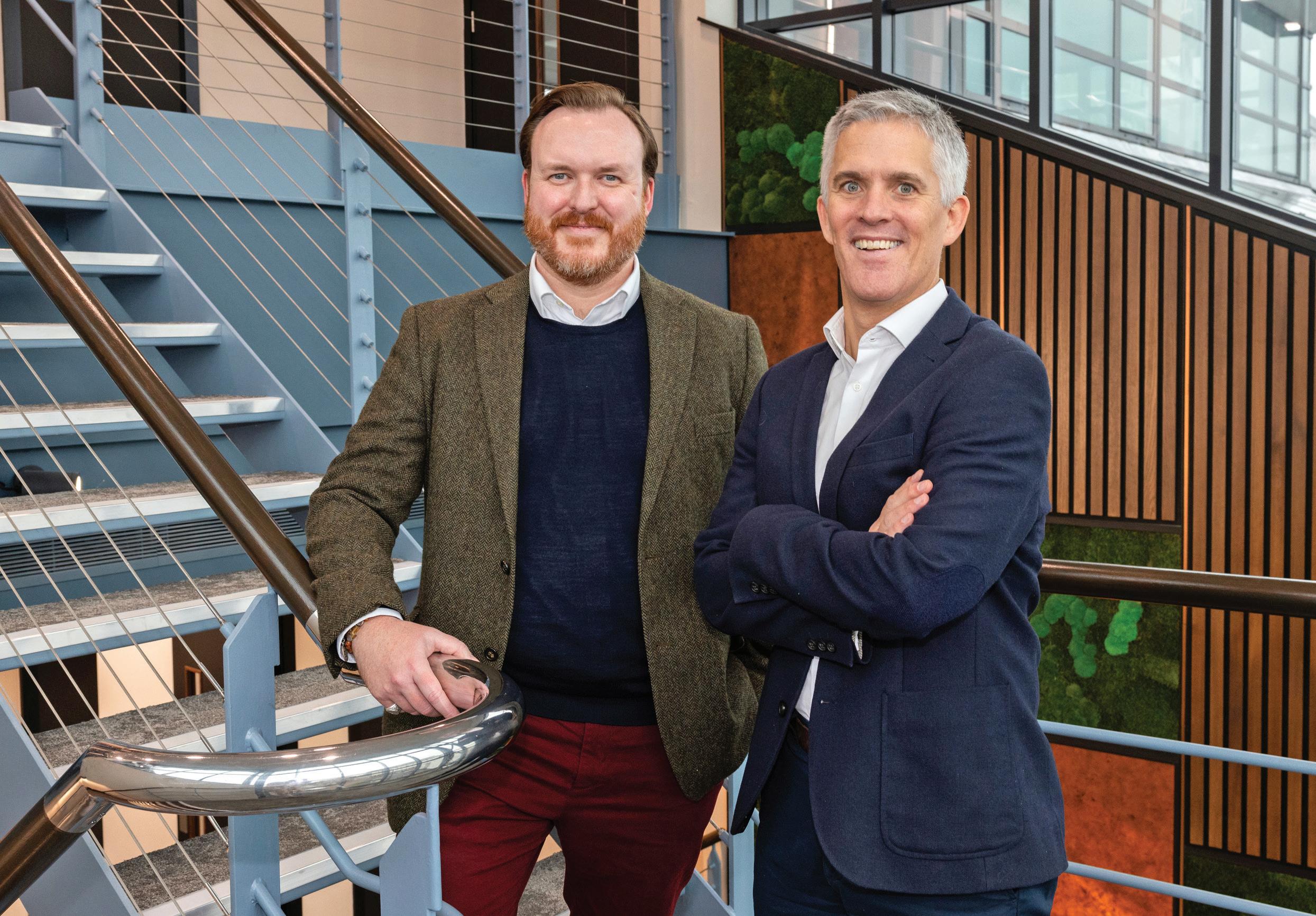
One year on from his appointment as BDO’s regional managing partner, Steve Le Bas explains how the firm is investing in Central South for the long-term.
BDO has signed a 15-year lease and invested into an office refurbishment to provide the home for its 260-strong team and support future growth ambitions. We are firmly committed to the local market and our refurbished office will provide the foundations for us to continue investing in the region by creating jobs and supporting ambitious organisations and growing businesses across all corners of the region. It’s these businesses that we call the UK’s Economic Engine, and we are proud to offer a range of advice and expertise to help them succeed.
The multi-million-pound renovation project at Arcadia House on Maritime Walk, Ocean Village, in conjunction with the landlord Forelle Estates, provides our people with a modern and collaborative working space, along with investing heavily in its ESG credentials. Our people are at the heart of our business, and we believe the Central South has some of
the top talent in the UK, which is why we continue to invest here. As such, it’s hugely important for us to provide a more flexible working model, which allows us to blend digital connectivity and physical space, encouraging effective collaboration with each other, the businesses we work with and colleagues in BDO’s global network.
Our latest round of promotions also reinforces our commitment to investing in our people, whose expertise and dedication is the secret to our longterm success. In total, 81 people were promoted in recognition of their talent and hard work. The round of promotions follows the appointment of 25 new trainees to our Southampton office as we invest in the next generation of advisers.
We also named two new partners in the Central South with Chris Williams and Aaron Winter promoted in our
Southampton office. Public sector audit partner, Aaron Winter has played an integral role within Southampton’s audit practice, leading the delivery of internal audit and advisory services to local government and NHS organisations.
In his new role, Chris Williams, tax partner, will work alongside the 50-strong Central South tax team to continue to build the firm’s portfolio of entrepreneurial and highgrowth businesses.
Our people have all worked extremely hard to build what has now become a £1bn firm. We remain committed to investing in first-class people and firstclass infrastructure in the Central South and across the UK regions. The underlying strength of our firm and the talent perfectly positions us for success in the years ahead as we look forward to working with businesses in the region and beyond.

Recently promoted tax partner, Chris Williams looks at what motivates him about the Central South businesses he works with and what he thinks the future holds.
As the new year approaches, businesses across the Central South are looking ahead with optimism and their hallmark resilience. Despite the economic headwinds and policy changes that have buffeted the market in recent months, there is a palpable energy and determination to seize the opportunities that lie ahead. We’re seeing a real shift in the mood and mindset of businesses in our region.
There’s a recognition that while challenges remain, such as the impact of the national minimum wage rise and increase in National Insurance Contributions, there are also significant avenues for growth and expansion, which is a hot topic for the businesses we speak to every day.
This sentiment is echoed by BDO’s recent economic engine survey, which found that despite the seemingly neverending challenges facing businesses in the region, more than a third of Central South businesses (37%) intend to prioritise expanding their product and service lines over the next six to nine months, in a bid to achieve their growth targets. Two-fifths are planning to invest in research and development, including new technologies.
It’s encouraging to see that innovation remains at the core of how businesses



intend to reach their growth potential. Businesses in our region have demonstrated time and again their ability to find a way forward, even in the face of adversity. We believe that this resilience will continue to drive progress in 2025.
Overall, the recent clarity provided by the government’s budget has helped alleviate some of the uncertainty that had caused businesses to hold back in recent months.
As businesses navigate the evolving landscape, many are also looking beyond their traditional domestic markets and exploring new geographies for growth. There’s great potential in exploring overseas opportunities and international trade is something our region has a rich heritage in. Right now, we’re seeing a real appetite to take bold steps and pursue new markets.
It’s because of this resilience and ingenuity that I’m so passionate about working with the businesses that make up the economic engine. However, businesses will need support to achieve their ambitions.
The businesses that we describe as the UK’s ‘economic engine’ include mediumsized businesses with a turnover of £10m - £300m, as well as those that are private equity owned, or AIM listed.
Despite accounting for just 1% of the number of UK businesses overall, these businesses report revenues that are equivalent to more than half the value
of UK GDP and they’re responsible for almost one in three private sector jobs. However, they continue to fall into a public policy gap – too large to benefit from policies tailored to small businesses, yet too small to command the same attention as the biggest end of the scale. They are the unsung heroes of UK economic growth.
Our BDO Mid-market Manifesto for midsized businesses outlines measures to enable these businesses to succeed. Amongst other asks, it calls for the Government to create a cross-party commission on tax to develop pragmatic solutions to key fiscal matters, and ensuring mid-sized businesses have the skills pipeline they need to grow and expand.
We’re excited about the future potential of the Central South specifically and it’s fantastic we are continuing to invest here. Our knowledge of the region’s business community means we’re embedded in the fabric of the Central South. We have a unique perspective on the challenges and aspirations of the businesses we serve because of our local expertise, combined with the strength of our global network.
We believe mid-sized businesses in Central South are the driving force of the regional economy. The key to future success will be that they are encouraged and incentivised to grow through policy and a tax system that supports their strategic ambitions.


Neil Poulter on the firm’s surging growth and why they don’t often shout about it
by Stephen Emerson, Managing Editor

Pour resilience, hard graft and teamwork into a melting pot. Over time, you may forge the type of company culture that has made Ocean Partners one of the most successful companies in the Thames Valley.
The global metal trading firm, based in Maidenhead, has seen a growth surge over the past two decades in a competitive and evolving industry that is being reshaped by technology and sustainability.
Ocean Partners provides services throughout the metal supply chain from mine to smelter.
It buys raw materials from mines around the world including in the Americas, Australia, Africa and sells to markets such as those in Europe, China and Asia.
The company also provides financing, global transport, warehousing and blending services to the industry.
The company, which is 20 years old in its current incarnation, has grown to an annual turnover of close to £3.2 billion and has net assets of £127 million.
For a company with such a huge turnover, it only has 130 employees worldwide.
It was the second largest privately owned company in The Business Magazine’s Thames Valley 250 Ranking, just behind
You have to take a few risks in life. Not everything will work, but if you don’t try new things then you end up just stagnating or going backwards.
Westcoast which was acquired by Swiss technology provider ALSO in July.
The Berkshire company has its largest offices in the UK and US and was established in 2004 following a management buyout (MBO) of the ores and concentrates trading division of French firm Pechiney World Trade, which had itself just been bought by the mining giant Alcan.
It has carved out a niche in providing products that bridge the gap in the supply chain from miners to smelters
Neil Poulter, the firm’s Vice President of Finance, explained to The Business Magazine what makes the company tick and the elements of its culture that have conspired to create its current success.
It is the company’s culture and resilient nature, Neil says, that has contributed to its growth since its MBO and helped it turn a profit each year over the past two decades.
An online search before speaking to Neil, reveals only a trickle of news coverage on the company, underlining its preference for keeping a low profile.
“We are well known in our industry but are generally happy to remain under the radar outside of that”, Neil said.
“Our business is worldwide and while little of our physical material touches the UK shores, the UK’s location makes it an ideal place to service our worldwide business with the London Metal Exchange remaining a critical part of that business.”
Aside from getting on with the job at hand and being publicity shy, what other features define Ocean Partners?
Neil said the firm has a flat management structure and is run as an owner-managed partnership with more than 25 staff shareholders and no-one with significant control.
He said: “We’ve been working on improving the integration between the offices and teams in recent years.
“You have to be adaptable and creative to work in this business because there are so many moving parts.
“Teamwork is critical because there has to be cooperation between all of the different teams, be it commercial, finance or logistics.”
Teamwork is a word that comes up time and time again when speaking to Neil who says that preparing people for the tough decisions of management is key to the company’s approach.
He said: “There’s a principal that says you should promote people until they get to one level below their level of incompetency. It seems obvious but it is often overlooked and so I am a great believer in promoting people based on their suitability for a new role and not on how good they were in their previous role.
“Management can be tough, so you need to properly prepare people for this.”
Often the narrative around successful companies can paint a picture of a linear success journey, however the reality is very often one of pivots and reinvention.
Neil says that by developing a strong culture and team, Ocean Partners has been able to respond to changes in the market.
He said: “Ocean Partners has had to reinvent itself every few years.
“You have to take risks in life to move forwards but they should be measured risks, and not everything will work, but if you don’t try to push the boundaries then you have a danger of stagnating or going backwards.”
Ocean Partners has had to respond to the rapid increase in the speed of communication and also the widespread consolidation in the market which has led it to refine its industry offering.
He said: “When I first started working in the industry my boss would go to China for a two week trip and he would send back a multiple page fax each day with all the

You absolutely get out of life and business what you put into it. Actions really do speak louder than words. I’m someone that just rolls up my sleeves, gets on with stuff
instructions for my day ahead whereas now all information is instant at the touch of a button.”
“There has been consolidation in the industry with, for example, trading companies buying both producers and mines. We have had to adapt and become more specialised through listening to what the customers want.”
Sustainability is also reshaping the industry, with mined materials being a key component of electric devices such as electric vehicles.
Neil said: “The biggest driver of change over recent times has been ESG (environmental, societal and governance). Mining has at times had a bad press, however there is a general acceptance now that it is critical in driving the ESG economy.”
Educated as an ICAEW chartered accountant, Neil is in his 10th year at
Ocean Partners having spent a large part of his career at London-based metal trading firm Wogen Resources.
Neil said: “You absolutely get out of life and business what you put into it. Actions really do speak louder than words. I’m someone that likes to roll up my sleeves and get on with the job in hand.”
It is the nature of the metal trading industry and its need for creativity and problem solving that has kept Neil in the industry for 26 years.
He said: “The industry is very relationship driven and you have to work hard to build up your network. You’ve got to have trust in your colleagues and be trusted. It’s large numbers you’re talking about, one parcel of material could be worth over $50m.”
“What keeps me going is that it’s a challenge every day. It keeps your brain going and every day is different.”
A generation ago, executive leaders rarely had to think about technology. Despite being in transition from an analog to a digital world, IT was for others to worry about – while they focused on the business, writes Tim Walker, Managing Director, Aura Technology.

Today, it looks very different. When you contemplate the new year, technology should be firmly on your mind. IT has a direct bearing on your ability to compete, economics of every operation, workflows up and down the supply chain, staff productivity, and your customers’ expectations.
Your IT team and MSP partners are deeply involved in the technical detail – but it’s ultimately about business. It’s important for leaders to understand the key imperatives for 2025.
Inexorable increase in cyber risk
The Government’s 2024 Cyber Breaches figures starkly demonstrated
rising risks, as 50% of businesses reported a cyber incident in the previous 12 months. In 2025, leaders must seriously consider the implications. Not just by bringing in experts to penetrationtest and implement defences for systems and email inboxes; but also by building more cyber-aware, cyber-ready cultures, and being ready for anything with a strong business continuity plan.
Those without expert support should replace DIY defences – and every organisation must keep cyber security bang up to date.
When ChatGPT launched generative AI into our consciousness in 2022, it started a chain realisation that AI could change... everything. Now, organisations that have been hanging back to see what happens may start to see themselves more and more disadvantaged as competitors adopt constantly advancing AI decision-making and analytics, intelligent workflows, customer experience management and new service innovations.
Your business and IT minds and advisers must come together to work out how AI will fold into the IT strategic roadmap – or develop one, if it’s missing.
Continuous change in shape of work
The fight to return employees to offices is underway. 28% of UK working age adults work remotely, say ONS statistics, but the global trend is reversing. It presents new challenges. Most organisations used IT to implement remote working – yet many have security vulnerabilities from rushed implementations. With a return of staff will come all your employees’ latest personal devices, too; in a hot cyber-security environment, implementing zero-trust technologies is becoming an essential.
In 2025, the emphasis must be as much on security as on flexibility as you reshape your model.
These three factors are, inevitably, only part of the story. IT and business are inextricably, irrevocably linked and an agile and future-proof IT strategy will impact how you can grow, innovate, stay ahead of competitors and meet your sustainability aims. Having the right expert advice in your corner ensures that you can navigate these IT imperatives with confidence.

Corporate partner at Shakespeare Martineau James Hawkeswood demonstrates how businesses can be a force for good.
One of the things that attracted me to Shakespeare Martineau was its strong culture, believing business could be both purposeful and profitable, with one often leading to the other.
In my day job as a corporate lawyer, I have been fortunate enough to work with a number of people who have used this combination of a strong culture and the desire to make a positive impact to achieve incredible things. Here are just two:
Building your business to drive environmental ambitions… Simon Morrish
Someone who knows the value of engaging and empowering people to drive performance is Simon Morrish, CEO of Ground Control and Xlinks.
Simon is an ex-McKinsey consultant and Morgan Stanley Derivatives analyst. He holds a master’s degree with Distinction in Economics, Engineering and Management from Oxford University and an MBA degree with Honours from Harvard Business School. He was awarded the EY Entrepreneur of the Year award for Transformational leadership in 2018.
Employee incentivisation has been a key theme through all of Simon’s ventures. Having worked with him since the early days of his involvement in Ground

Control in 2006 I have seen it grow into a highly respected, multi award-winning environmental services business looking after over 60,000 sites in the UK.
Throughout this time Simon has been constantly leveraging his business interests to serve his key passion: caring for the environment:
• In 2020, Ground Control launched the Evergreen Fund, devoting 5% of Ground Control’s annual net profits to a £5 million Impact Venture Fund dedicated to environmental initiatives, rewilding of the countryside and reducing carbon emissions;
• Through Solar Ventus (which he founded in 2010) he has built over 100 wind turbines, which currently supply renewable electricity to over 2,600 households in the UK;
• He set up Future Motors to decarbonise buildings by offering 30-50% energy savings on new retrofit switched reluctance motors that not only save energy but have a payback period of approximately three years; and
• His drone and eVTOL venture, Skyports, is promoting emissions-free air transport for both people and goods.
All of these pale into insignificance next to his latest project: Xlinks. The Xlinks Morocco-UK Power Project aims to generate 11.5GW of zero carbon electricity from the sun and wind in Morocco’s Guelmim Oued Noun region, and to ship it direct to Great Britain via 4000km (2485 miles) of HVDC sub-sea cables. Most importantly this power is firm and flexible, delivering higher load factors between the peak hours of 7am to 11pm than nuclear and at less than two thirds the price.
This would be enough to provide affordable, clean power to the equivalent of over 7 million British homes; a truly remarkable achievement.

Completing the circle: investment, philanthropy and spreading the word… Jay Verjee
Another alumnus of Harvard’s Business School, Jay Verjee grew up in an entrepreneurial family and in his own words ‘was always encouraged to see how business could be used as a vehicle to help society’.
As the Chair of the Rumi Foundation (which was set up by his uncle, himself a highly-successful entrepreneur), Jay helps identify and promote grass roots charities around the world, seeking to
Unlocking potential

give them a springboard to develop their own projects, profile and activities. The Foundation does this not just by providing finance, but also by mentoring the people that are involved in the charities and giving them access to wider networks which may be beneficial.
In Jay’s words: “We provide our skills, mentality and money: taking the approach and rigour we use in our business lives and applying them to charitable organisations and projects to help them succeed.”
Jay follows a similar approach in his own entrepreneurial endeavours; he is increasingly drawn towards businesses which make money AND do good –whether by the products and services they supply or by the impact they have on their local community (they may for example provide a lot of jobs in areas where employment opportunities are scarce).
As Jay sees it, in the traditional model of capitalism, ‘success’ was to invest and deliver profit for shareholders. Now success is about investing to deliver more than just profit to the shareholders; it is
Since launching its responsible business programme in 2021, doing what’s right for its people, communities, and the environment has become engrained in everyday life at full-service law firm, Shakespeare Martineau.
Proving you can be both purposeful and sustainably profitable,
For more information
about creating benefits for a wider group of stakeholders.
As with his family foundation, supporting education is seen as a priority because of the ‘multiplier effect’ it creates. In Jay’s case this tends to focus around the institutions he himself attended (he and his wife have endowed a fellowship at Harvard Business School, and are working on student access programmes at Cambridge). One of the big cultural differences between the US and the UK, he notes, is that in the US, if you go to a prestigious institution like Harvard it is taken as a given that you will have an ‘obligation’ to give back an element of your success. That is not yet how things are viewed in the UK, but rest assured Jay is working on it!
As Simon and Jay (plus many others) have shown, aligning a strong people-centric culture with more than just financial goals can be a powerful recipe for success. Maybe the next time you wonder if a business decision is going to pay dividends, you can ask if those dividends might be more than money, and who is going to be receiving them…?
Shakespeare Martineau is a registered B-Corporation, is working towards a Net Zero 2030 plan, has exceeded SRA benchmarks for racial and gender diversity in 2023 and shot up the The Lawyer Top 100 rankings, placing number 47 for 2024.
The Southampton team is looking to grow – if you’re an experienced lawyer looking for a firm that shares your values and offers real career development, get in touch.
please contact: James.Hawkeswood@shma.co.uk

From ill-fated acquisition to last-minute rescue deal, could a “cultural reset” put the beauty retailer back on top?
by Daniel Face, Senior Reporter
It’s been a turbulent 12 months for The Body Shop.
Founded in 1976, within a decade the retailer had come to dominate the industry with its natural, ethically sourced beauty products.
Times have changed since the days of founder Anita Roddick – who set off a string of acquisitions when she sold the brand to L’Oreal in 2006 – and many customers agree that, somewhere along the way, it lost that trailblazing spirit.
As the business emerges from administration (not without hundreds of jobs lost, mind), it’s no doubt keen to recapture some of that early magic.
What better way to signal a “cultural reset” than to return The Body Shop HQ to Brighton, where it began life as a little green-painted shop on the high street?
That’s been the first major move from the new owners. But they’ll need more than that to win back the market.
Rewind to November 2023 and The Body Shop had just been bought by German investor Aurelius, which at the time promised to “re-energise” the loss-making business.
What followed instead were disappointing Christmas sales and by February the retailer
had been placed in administration.
After months shedding assets, a consortium led by British cosmetics tycoon Mike Jatania agreed a rescue deal in September, protecting the remaining 113 stores and 1,300 jobs across the UK.
Mike pledged then “to focus relentlessly on exceeding expectations by investing in product innovation and seamless experiences across all of the channels where customers shop”.
Perhaps that could mean the return in some form of The Body Shop at Home, the company’s direct selling channel axed in January under the leadership of Aurelius.
In, too, came a new CEO – Charles Denton, formerly of skincare brand Erno Laszlo and fragrance giant Molton Brown, who committed to a “strategic plan that sets up the business for long-term growth”.
“As we work to rebuild and reimagine the future of our brand, it’s essential we foster an innovative and collaborative culture to make this next stage in the journey possible,” Charles added.
“At The Body Shop we’re looking backwards to move forward, using past experiences as a foundation for growth, learning from both successes and failures to navigate future challenges with greater insight and resilience.”

It’s with that in mind that the team have upped sticks from the old company base in Littlehampton to make a new home at Plus X Innovation, a co-working and support programme provider in Brighton.
“Returning to Brighton reinforces the values upon which we were built.
“It’s a city that celebrates diversity and creativity, oozing irreverence and new ways of thinking stimulated by a vibrant youth culture.”
Sounds like The Body Shop which first won over young customers through the 80s and 90s.
Meanwhile, the company is rebuilding its senior team, having just recently brought aboard chief marketing officer Penny Brook and chief financial and operations officer Sally Dowling.
The stage is set for the return of an iconic brand – the question is, can they pull it off?

Buckmore Park, the Kent karting circuit which helped launch the careers of Lewis Hamilton and Lando Norris, has unveiled plans for a new 20,000 sq ft motorsportthemed hub.
Pending council approval, The Paddock will feature a 120-seat restaurant and sports bar, 100-seat conference room and a roof terrace overlooking the circuit.
It will also house 18 racing simulators.
The design is inspired by the pitlanes from the golden era of motorsport – and the
days of John Surtees, former owner of Buckmore Park and F1 champion.
The circuit is co-owned by John’s daughter, Leonora Martell-Surtees, and her husband Richard.
“Today’s karting community and general public demand not only a challenging circuit offering an exhilarating racing experience, but also the facilities that create a destination in its own right,” she said.
“The Paddock will add an exciting new dimension to what Buckmore offers. It will be the ideal place for visitors of all ages to watch F1, World Endurance Championship, Formula E and F1 Academy, as well as having the chance to get on track themselves.”
The development could create another 30
jobs on top of the 50-strong workforce at Buckmore Park, which sits near the M2. Richard added: “Last year saw us successfully launch the Buckmore Driver Development Programme, an intensive week-long course to elevate young drivers’ careers with tuition on fitness, nutrition, engineering and racing skills.
“Due to demand, we’ve already scheduled further programmes for April and August this year.
“The Paddock will be the programme’s new home and provide hands-on experience thanks to the simulators and circuit, combined with the briefing and classroom facilities to nurture yet more sporting legends.
“If approved, we aim to be breaking ground on site next year and open to visitors in 2027.”

BAE Systems is to embark on a £220 million renovation project for its electronic systems teams in Rochester.
The new 32,000 sq m factory will house the company’s 1,600-strong Kent workforce, combining manufacturing, engineering and office space on one site.
The teams will have access to advanced aerospace technologies like head-up and helmet-mounted displays, flight control computers and active control sticks for civil and military aircraft.
BAE Systems hopes the expansion will create 300 jobs over the next five years.
Dave Banks, director at the Rochester site,
said: “This significant investment will help us attract additional highly skilled jobs to the Medway area.”
Work is already undern way to prepare the site for redevelopment, due to start this year.
Cllr Vince Maple, leader of Medway Council, added: “As our largest private sector employer, this is a strong vote of confidence in Medway being a great place for businesses to invest and grow.
“As well as boosting the local economy, this investment will provide even more skilled employment opportunities for local people, help develop young talent and encourage others to base their businesses here.”
CybaVerse, a Sussex company building an AI-powered cybersecurity platform, has secured more than £1.1 million in funding to grow its team and operations.
The firm, led by CEO Oliver Spence, is backed by FSE Group, Haatch, Founder + Lightning, and individual investors from FSE Angels and the University of Sussex Business Angels.
It’s recently made three senior hires, including cybersecurity veteran Andreas Wuchner as chair.
Andreas has held senior roles at the likes of Deutsche Bank, UBS and HP.
“Cybersecurity is the most critical challenge in the digital world, and we must support SMEs with a more efficient way to defend against the threats they face, otherwise we’ll always be on the back foot to adversaries.
“I believe CybaVerse is making strides in tackling this important issue, and I’m delighted I’ll be playing a part in helping them reach this goal.”
Juliette Hudson – previously of Kroll, Bupa and Symantec – has also joined as chief technology officer, while Nicola Hartland is now brand adviser and a non-executive director.
Logical Biological has settled into larger, upgraded lab space at Discovery Park innovation campus in Sandwich – its third move on site.
Founded with just two employees and now shipping to more than 24 countries, the diagnostics firm has boosted its international trade by 170 per cent over the past three years.
This export success earned the team a prestigious King’s Award for Enterprise last year.
“Our growth has been driven by our ability to pivot rapidly and successfully post pandemic when many other companies were less fortunate,” said CEO Stephane Argivier.
“Our new facilities meet the high containment standards we require and offer the ability to achieve operational excellence beyond our size with purpose-designed laboratory space and capacity to meet our ambitious expansion plans.
“Discovery Park has been instrumental in supporting our journey.”
The park also runs Discovery Spark, a six-week course for early-stage life science ventures.
On the latest cohort are bioluminescent imaging firm Bioflares and cancer therapy researchers RS&RS Scientific, among eight others.

One of the UK’s most innovative aerospace firms has crashed into administration. What went wrong and what’s been lost?
by Daniel Face, Senior Reporter
In November, the prime minister announced a near £1 billion investment over the next five years in the UK’s aerospace sector.
Unfortunately for one Oxfordshire firm, it was too little, too late.
Sir Kier’s announcement came just weeks after the industry was dealt a major blow as Reaction Engines – dubbed the spiritual successor to Concorde – went into administration.
The company had reportedly been hanging on for a £20 million rescue deal led by the United Arab Emirates’s (UAE) Strategic Development Fund, which fell through in the dying hours.
Its existing investors, BAE Systems and Rolls-Royce, were unwilling to cough up more cash.
Has Reaction Engines’ demise come as a shock? The last update to shareholders hailed commercial revenue growth of 400 per cent in the previous year and a strong pipeline of contracts lined up.
But critics have argued that the firm was always more research lab than a commercially viable business, and when grants and fundraises began to dry up in recent months, it soon struggled to stand on its own two feet.
Founded in 1989 by three former Rolls-
Royce propulsion engineers, Reaction Engines made a name for itself in the aerospace world with SABRE – the Synergetic Air Breathing Rocket Engine.
It was hoped that SABRE would one day find a home on Skylon, Reaction Engine’s concept hydrogen-fuelled aircraft planned to take off horizontally before accelerating to hypersonic speeds into low Earth orbit.
As a single-stage-to-orbit (SSTO) craft, Skylon would be completely reusable, taking off and landing without having to shed tanks, engines and other very expensive components.
SABRE could also have carried forward the efforts of Concorde, powering jets to shuttle passengers from Britain to Australia in as little as four hours.
After decades in development, neither SABRE nor Skylon have taken flight –though that’s not to say the fall of Reaction Engines hasn’t left a significant hole.
Before it went under, the firm had played a key role in the £1 billion Hypersonic Technologies and Capability Development Framework (HTCDF).
The project, a Ministry of Defence initiative to build the UK’s first hypersonic missile, could now be in jeopardy.
Reaction Engines also provided its water-to-

air cooling technology to Mercedes, which in turn supplies engines to the Formula 1 teams of Aston Martin, McLaren and Williams.
And just last summer, The Business Magazine reported on some promising upcoming trials for the company’s heat exchangers – both with BAE Systems for use on naval vessels and with the US Department of Energy to help decarbonise the nation’s industrial processes.
Though it may have been the lofty ambitions of hypersonic flight that made headlines for the past 35 years, the genuine technologies born out of Reaction Engines’ research will be missed in sectors spanning far beyond aerospace for years to come.
Simon Henley, a former senior adviser and shareholder, said in the aftermath:
“I fervently hope that it’s not too late to save what Reaction Engines has created by keeping together the intellectual property rights, the means of producing the technology and at least some of the knowledge intrinsic in the people.
“Mankind needs what Reaction Engines was doing, and we’ll all be the poorer if it’s allowed to trickle into the sand.”
Adaptix, an Oxford firm specialising in lowpower 3D X-ray imaging, has signed two new distribution agreements.
The firm first announced metrology provider Sempre as the official UK and Ireland distributor for its NDT3D products, which generate fast, non-destructive X-ray images.
NDT3D has a range of applications across traditional, composite or additive manufactured aerospace components, batteries, battery arrays and electronics.
“We’re thrilled to be partnering with Sempre to bring our technology to a wider audience,” said Martin Holden, development engineering manager for NDT at Adaptix.
“As the industry moves towards lightweighting components, new methods of inspection are required to ensure they are fit for purpose.
“The Adaptix NDT3D inspection tool can be used early in the manufacturing process, dramatically reducing waste, manufacturing time and inspection time.”
Also partnering with Adaptix is Clark Dental Veterinary, which will distribute the company’s relatively new SA3D vet imaging product within the UK.
A new report has capped off a successful year for Oxford University Innovation (OUI), the university’s technology transfer office.
It reveals that OUI raised £19.5 million in seed funding and £872 million in investment, filed 93 patents and launched 15 new companies, including 10 spin-outs.
Among the newcomers hailed as “potentially world-class” is MatchBio, established in January 2024 with a £4.5 million investment to pioneer advancements in cancer immunotherapies.
Another spin-out, Oxford Semantic

SA3D is said to provide vets with more detailed, higher resolution images, offering better visibility into tissues and bone structures and therefore enabling more accurate diagnoses.
“Adaptix has developed an exciting imaging technology in the Adaptix SA3D,” said James Beal, director of Clark Dental Veterinary.
“We’re delighted to include it in our product portfolio.
“It will transform dental, orthopaedic and exotics imaging, from both clinical and financial perspectives, and that is something we know all our customers will welcome.”
Adaptix earned recognition for the most exciting emerging technology at the Aerospace Technology and Innovation Awards last October.
Technologies, was snapped up by Samsung in June.
The OUI team also saw more women involved in commercialisation projects, up from 27.8 per cent of individuals in 2015–16 to 33.7 per cent in 2022–23.
“As the world confronts increasingly complex challenges – climate change, public health crises, and technological disruptions – our ability to innovate at speed and scale has never been more critical,” said Baroness Nicola Blackwood, chair of OUI.
“Over the past year, OUI has continued to play a pivotal role in transforming groundbreaking research into tangible economic and societal benefits, strengthening our position as a global leader in innovation.”

Milton Park business campus in Oxfordshire has welcomed three life science biotechs to its co-working space at Bee House.
Oxehealth, which provides contactless patient monitoring for inpatient mental health, has moved in alongside Physiomics, a quantitative pharmacology and biostatistics consultancy helping to accelerate and derisk drug development.
They’re joined by Outrun Therapeutics, a preclinical biotech looking to unlock the therapeutic potential of protein stabilisation to treat cancer and other diseases.
Other tenants include digital healthcare provider M3, green hydrogen innovators Electrogenos, and OBN, a membership organisation for the UK’s life sciences sector.
Bee House accommodates businesses of all sizes, with coworking areas for freelancers all the way up to 2,500 sq ft private offices.
“Increasingly, our occupiers are looking for flexible facilities which can adapt to changing needs, giving employees hybrid working opportunities and the option to network among likeminded individuals,” said Nikki Gibson, who oversees Bee House.

Oxa has hailed a “significant leap forward” in the commercialisation of self-driving technology.
Software developed by the Oxfordshire firm is now successfully powering Ford E-Transit vans and minibuses as they navigate roads in the UK and US.
A fully electric version of Europe’s bestselling van, the standard E-Transit carries a 68kWh battery providing a range of up to 197 miles – roughly triple what the average driver covers in a day, says Ford.
This makes it a perfect fit for Oxa, which seeks to “transform how businesses in any industry move people and goods”.
“Making the Ford E-Transit available for autonomous operations is the next step on our journey to deliver safe, scalable and sustainable autonomous solutions,” said Gavin Jackson, CEO of Oxa.
“This vehicle represents an important milestone in our mission to reshape the future of passenger transportation and logistics.”
Oxa has developed a series of reference autonomy designs (RADs) – blueprints which allow its self-driving software, including sensors and drive-by-wire systems, to be loaded quickly and easily on to host vehicles like the E-Transit.
These in turn are designed to integrate

into existing logistics fleets (in the case of the van model) or passenger services (in the case of the minibus, which can stretch to 10 seats).
With 360-degree perception and longranged detection built in, the vehicles can operate autonomously up to 35mph in mixed traffic. The driver can take over at any time.
Oxa plans to operate a flexible distribution and licensing model which it says will be key to scaling commercial deployment of autonomous vehicles.
The company has also signed a partnership with Abu Dhabi’s Bayanat to accelerate the roll-out of self-driving cars in the Middle East.

Bicester distillers gin up interest on crowdfund campaign
Gin and vodka distillery Sky Wave has been welcoming new investors in an online campaign on crowdfunding platform Crowdcube.
Co-founders Andrew Parsons and Rachel Hicks launched the brand in 2018 – since when they’ve opened a bar and visitor space at Bicester Heritage and been crowned Distillery of the Year at the Gin Guide Award 2024.
Their latest crowdfund offers shares in Sky Wave from as little as £10, with “great rewards” promised for those participating.
“The support of customers like you –our friends – has been so important to us over the last few years,” Andrew told would-be investors.
“The community we’ve built over the last six years has got us where we are today, and that’s why we want to give back by giving you this opportunity now to own part of the business and join us on our next exciting stage of growth.
“We’re raising funding for a bigger marketing campaign, new sales staff to drive the growth and reach of the Sky Wave brand, and also for working capital.”
Rachel added: “We’re an independent business, and our dedicated team works really, really hard to create and deliver great drinks and experiences for you.”

While last year’s Autumn Budget saw Labour stick to their plans to not increase income tax rates, national insurance and VAT for individuals, the brunt of the tax changes made will be felt by entrepreneurs and SME’s, writes Patrick King, Tax Partner, MHA.

The tax changes announced by Chancellor Rachel Reeves, dealt a triple blow to entrepreneurs and SMEs with increases in employers’ national insurance, national minimum wage and an absence of any corporate tax cuts.
SMEs rely on tax stability when making decisions around investments and expansion, so the announcements will have left many feeling uneasy and forced to reassess future plans in view of the considerable tax bills that could arise. You
The biggest impact for many SMEs is the 1.2% increase to Class 1 Secondary National Insurance contributions to 15%, coupled also with the reduction in the threshold at which it will begin to apply from £9,100 to £5,000, both of which will take effect from 6 April 2025.
The above changes are estimated to cost businesses an additional £615 in national insurance for every employee earning above £9,100.
In addition to this, the national minimum wage is set to rise from April 2025, with the new rates being £12.21 per hour for 21 and over, and £10.00 per hour for 18–20-yearolds.
The apprentice rate has also increased to £7.55 per hour. This results in the estimated average cost of employing someone on national minimum wage increasing by 10%.
The employment allowance which can be deducted from Class 1 secondary national insurance liabilities has increased from £5,000 to £10,000, with the £100,000 threshold also being removed. Whilst this will cover the national insurance costs of a
business employing four full-time workers on national minimum wage it does little to soften the blow for employers with large staff numbers.
The hike in employers’ staffing costs will leave many SME’s re-evaluating their recruitment plans and future pay rises.
The main rates of capital gains tax, which apply to assets other than residential property, have increased from 10% and 20% to 18% and 24% respectively with these increases taking effect for disposals made on or after 30th October 2024.
The lifetime limit on business asset disposal relief (BADR), which is available on a sale of shares in a personal trading company, remains unchanged at £1 million.
The rate of capital gains tax applicable to disposals which qualify for BADR will remain at 10% for disposals up to 5 April 2025. Thereafter the rate will increase to 14% for disposals in 2025/26, and 18% for disposals on or after 6th April 2026.
When introduced, BADR could result in tax savings of up to £1m, with effect from 6 April

2026 this will have dwindled to tax savings of a maximum £60,000.
The delay in the introduction of the capital gains tax rate increases for BADR could see entrepreneurs accelerating their decisions to sell or liquidate their companies.
Whilst changes to inheritance tax were widely anticipated, the changes announced were not as significant as many expected. However, as with many other changes announced, it was business owners and farmers that were largely targeted by the changes.
The headline change was the introduction of a limit on the maximum value that could qualify for 100% business property relief (BPR) and agricultural property relief (APR). Previously certain assets that qualified for BPR or APR could have 100% of their value free from inheritance tax.
From April 2026, there will be a combined £1m allowance available for business and agricultural assets. Any value in excess of £1m will attract a 50% relief, giving an effective IHT rate of 20%. The £1m limit applies to every individual, however any unused allowance cannot be transferred to a spouse on death contrary to other inheritance tax reliefs.
Business owners will now need to consider their inheritance tax exposure and revisit their Wills to ensure they are fully utilising this relief. Thankfully, there were no changes to the seven-year period for lifetime gifts, meaning business owners need to consider lifetime planning to avoid hefty inheritance tax liabilities that could place extra financial pressure on their businesses and families.
Consultations are expected to take place in April 2025 on the changes to BPR and APR, which could result in further changes to the reliefs.
Added to this the Chancellor also announced that from April 2027, most unused pension funds and death benefits will be included within the value of an individual’s estate and subject to 40% inheritance tax. The result being that if an individual dies after 75 this could result in a double tax charge. The change could also result in the loss of any residence nil rate band and hence at an effective tax rate of up to 70.5%. Previous advice about pensions may now be significantly different.
For corporation tax it was very much business as usual with very small technical changes announced. The corporate tax roadmap was announced with the aim of providing a stable and predictable

environment following years of change. It is confirmed that the headline rates of corporation tax, annual investment allowance, full expensing and R&D tax credit rates will all remain unchanged, providing welcome certainty for businesses. It is hoped that this will build the confidence needed to attract investment and bring economic growth.
What does this mean for me and my business?
Unfortunately, the Autumn Budget did not bring about much certainty or good news for entrepreneurs and business owners. The hike in employers’ national insurance leaves business owners with difficult decisions to make between recruitment and pay rises for existing members of staff.
Business owners will no doubt have to reconsider their business activities going forward and their personal succession plans.
If you would like to talk through any of these changes, please get in touch with our tax specialists.


For a few million pounds, you can buy a specialised helicopter to save lives, deploy in the military or for civilian policing, or to simply reduce commuting time
by Nicky Godding, Editor
And a third of our workforce are military veterans of one sort or another, so I’m in good company.

Last year Airbus Helicopters opened a new £55 million purpose-built headquarters at Oxford Airport, moving 250 staff across the airfield from its previous cramped buildings by the airport’s terminal which the company had occupied for 50 years.
Airbus is the biggest manufacturer of helicopters in the world. And while the company doesn’t build helicopters in the UK (European manufacture is done in France, Germany and Spain), the aircraft are brought into Oxford for fitting out, maintenance and repairs.
It is one of 25 Airbus services centres strategically located across the world.
Across the UK, Airbus Helicopters employs around 460 staff, including 130 at RAF Shawbury where all UK military pilots are trained.
Demand for helicopters as a form of transport for air ambulances, search and rescue, the military, police and corporate VIPs is rising.
And Airbus provides and supports all the UK’s police helicopters, supplies nearly two-thirds of the country’s air ambulance helicopters and supports around 70 helicopters in UK military service.
It is also the leading supplier of corporate and business helicopters in the UK.
Inside the huge hangar where all completion and maintenance work takes
place, the private helicopters stand out among air ambulances, police and military ones.
One of the helicopters undergoing regular maintenance when I visit is badged Aston Martin.
A few years ago, Airbus joined forces with the luxury British automotive marque to produce a total of 30 Airbus ACH130 helicopters fitted out in Aston Martin livery, including luxury leather seats. It’s just one of a series of Airbus’s corporate brand partnerships.
Lenny Brown has been Managing Director of Airbus Helicopters in the UK for three years.
Before that he was head of the aerospace company’s defence business and that followed a highly successful career in the military including as a Royal Marines pilot, which culminated in his role as Commanding Officer of the UK’s Commando Helicopter Force, part of the Royal Navy Fleet Air Arm, based at RNAS Yeovilton.
During his career he served in places such as Northern Ireland, Bosnia, Afghanistan, Libya and undertook humanitarian aid operations, including in East Timor.
Doesn’t he find his latest job a little …
tame? “Not at all. Over 30 years in the military a lot of my work was in policy and strategy, and I’ve worked in practically every UK military headquarters.
“I’ve also worked with civil servants, civilians and contractors throughout my whole career, so it was an easy transition. And a third of our workforce are military veterans of one sort or another, so I’m in good company.
“The big difference is that this job is to bring in money, not just control the spending, but the variety of work here is great.”
In Oxford, Airbus receives the basicbuilt helicopters, often unpainted and largely unequipped, from its European manufacturing centres. They usually arrive by truck but with engines installed, and the Oxford team customises everything else, depending on what the customer wants.
“That includes the avionics, defensive aid systems, communications and radios,” said Lenny. “That’s the difficult part. For instance, the police helicopters are one of the most complicated aircraft we design because of all the kit they need.
“These include emergency system radios, electro optical devices, uplinks, downlinks and a lot more.”

Oxford is also marketing and supporting the development of a new generation of unmanned aircraft, from the Flexrotor small tactical vertical take-off and landing system to the heavier VSR700, Airbus’ tactical unmanned aerial system (UAS), designed for ships and which is essentially a small helicopter.
Other new developments in the sector include Airbus’s DeckFinder, a local positioning system for precise automatic take-off, landing and navigation of UAS,
The police air service is also looking at urban reactive drones pre-positioned on the tops of buildings. This might sound a bit Thunderbirds, but what it means is drones in boxes strategically located on the top of buildings across the UK. When a situation kicks off, the box opens, a drone takesoff and starts reporting situation awareness immediately to help the police control centre decide whether boots are needed on the ground.
Airbus’s turnover in the UK is around £150 million a year and growing. This comes from its maintenance, repair and overhaul services, customisation, sales of helicopters and training military and civil engineers and aircrew. The company’s new generation of unmanned aircraft will broaden its income stream further.
One of the biggest challenges the sector as a whole faces is a shortage of skills. In Oxford and in Shawbury (where Airbus has 36 helicopters to serve the military helicopter training programme), the company is always looking to recruit qualified engineers.
Brexit didn’t help. “Skilled engineers from Europe who were building their experience in the UK had to return home because their licences were no longer recognised here,” said Lenny. “And while we have overcome some of the administrative hurdles, the situation is still very challenging.”
Airbus does have a healthy apprenticeship programme though, which Lenny has expanded since he arrived three years ago.
“When I first joined, our apprenticeships were dominated by young engineers, but I thought we could do better than that. Now we’ve got apprentices across the business including in design, engineering and in the office team – a technical role where they learn to put the requirements together for the customer. We’ve also got a PA apprentice and HR apprentices. Since I
joined, we have taken on an additional 29 apprentices. They’re lovely to work with and we get a real energy from them as well. They’re super enthusiastic.”
Airbus takes on around eight to 10 engineering apprentices a year. It’s a fiveyear apprenticeship and they have literally hundreds of applications, so can select from the best.
But it takes five years to become a CAA licensed air engineer, and another year to get their type rating.
The length of apprenticeship is a challenge.
“These young apprentices are clever and really motivated,” explained Lenny. “Many are very capable of going through the training more quickly. Signing off aircraft is a highly responsible job, but if they have shown themselves skilled and capable earlier, we should encourage that. It takes less time to qualify as a doctor.”
Airbus is also looking to roll out a STEM project it started last year at Gosford Hill School in nearby Kidlington.
“We asked our engineers to come up with training packs with teachers. It has been a great success for the 16–18-year-olds who took part, and our engineers are enjoying the programme too.
“We held a graduation ceremony before Christmas and are now planning to expand the programme across more schools.”
Airbus also has a partnership with the Royal Aeronautical Society, offers internships for graduates and sponsors a PhD student at the University of Southampton who is looking at the measurement of stress dynamics on helicopter rotor blades.
It’s also signed a Memorandum of Understanding with the Advanced Manufacturing Research Centre in North Wales.
“We are not a huge organisation in terms of numbers, but we are always ambitious to support good quality training and skills programmes,” added Lenny.
Does Lenny still fly helicopters? “Yes, but not as often as before. I love aviation I’ve been in it for decades now and couldn’t think of anything I would rather be doing.”
For many owner-managed businesses, success relies on founders’ entrepreneurial spirit and ambition. Their dedication includes investment of hard work and capital. However, there often comes a time where additional funding can be a catalyst to accelerate growth.


Identifying available funding isn’t always the challenge – it’s deciding which option to go for. Moore Kingston Smith partners
Jon Roberts Audit partner
Stephen Orriss and Jon Roberts shed light on this for us. The team works with ambitious businesses, helping them navigate the funding landscape and make informed decisions which support their individual growth strategy.
Stephen Orriss M&A partner


+44 (0)79 7619 8459
For many, this leads to private equity investment. It offers the opportunity for rapid growth, supports majority or partial exits, helps optimise existing capital structures and drives expansion. Choosing what’s best for you requires clarity and understanding of ambitions and financing requirements. Approached correctly, PE can be transformative for growth, benefitting all parties.

jonathanroberts@mks.co.uk
+44 (0)77 8872 0248 sorriss@mks.co.uk
+44 (0)79 7619 8459 jonathanroberts@mks.co.uk Stephen Orriss M&A
• Target identification: Identifying suitable platform and add-on companies with the right culture, financial health, strategic fit and growth potential is critical.
Buy and build is a powerful strategy for creating value and scaling businesses, by using a platform company as a foundation for add-on businesses that drive growth and synergies. The goal is to build a larger, more efficient and competitive group by combining collective strengths, knowledge and capabilities.
Thames Valley /Heathrow office:
Thames Valley /Heathrow office:
The Shipping Building, The Old Vinyl Factory, Blyth Road, Hayes, London UB3 1HA
• Value creation: PE aims to help entrepreneurs grow value by streamlining operations, enhancing market reach and improving competitive positioning and product or service offerings, resulting in revenue growth and cost savings.
@MooreKSLLP
Find us on LinkedIn
mooreks.co.uk
The Shipping Building, The Old Vinyl Factory, Blyth Road, Hayes, London UB3 1HA
@MooreKSLLP
Find us on LinkedIn
mooreks.co.uk
• Diversification and risk mitigation: Acquiring companies across geographies, markets, or product lines diversifies revenue streams and reduces risk, cushioning the impact of economic or market-specific challenges. Combined resources, expertise and market presence drives rapid growth and market penetration.
• Talent: Acquisitions bring in new talent, expertise and ideas, enhancing overall capabilities. Leveraging diverse experiences drives strategic initiatives and operational improvements.


+44 (0)77 8872 0248 sorriss@mks.co.uk

+44 (0)78 3491 9460
Mike Orton Transaction services partner
• The integration process is complex and requires meticulous planning. Ensuring cultural alignment, harmonising operations and effectively managing change are essential to realising the full benefits.


• Management: Effective leadership is vital for success. Awarding management equity is a powerful tool in aligning interests and there are often complex tax implications for all parties to consider.
Areas to focus on
+44 (0)78 3491 9460 morton@mks.co.uk Supporting clients in a
+44 (0)79 7619 8459 jonathanroberts@mks.co.uk
• Management team: A committed team that has the breadth and depth of qualities is a key criteria for partnering with PE. If the team is supported by a value creation story, manageable risk profile and the deal dynamics work for both sides, there’s a platform for success.
• Working capital: Investors require sufficient working capital to avoid further cash injections post-deal.
Thames Valley /Heathrow office:
Choosing the right funding strategy is key to driving growth and realising your business’s ambitions. Despite a continually evolving PE landscape, buy and build remains a solid strategy for achieving sustained growth and profitability. Having recently secured investment itself, Moore Kingston Smith is living and breathing PE, enabling the team to bring that lived experience to clients.
The Shipping Building, The Old Vinyl Factory, Blyth Road, Hayes, London UB3 1HA
@MooreKSLLP
Find us on LinkedIn
mooreks.co.uk
The team’s tailored advice spans deal advisory, due diligence, accounting judgements, audit, debt advisory, exit readiness, corporate tax and valuations. With expertise and experience in and around the Thames Valley, they help clients navigate challenges and seize opportunites, designing bespoke solutions for maximum impact.
*This article is intended solely for information purposes and doesn’t constitute advisory, accounting or investment advice.
information

The life sciences sector is a welcome jewel in the UK’s crown. While government support has improved, start-ups and scale-ups must be well prepared and presented to secure investor funding
Participants

Moderator Nicky Godding, Editor, The Business Magazine
Adaptimmune Therapeutics
Jo Brewer, Chief Scientific Officer
Clinical-stage biopharmaceutical company developing novel T cell receptor cancer immunotherapy products for patients. Technology spun out of the University of Oxford in 2000. Launched its first product into the market last year.
aVaxziPen
Robin Cohen, founder and CEO
Developing needle-free solid dose vaccines. Takes conventional vaccines and develops thermo stable, highly immunogenic versions of those and delivers them through a multi-use, needle free applicator.
Brainomix
Dr Michalis Papadakis, co-founder and CEO
Develops AI-power imaging biomarkers enabling precision medicine that helps with the diagnosis and treatment decisions for conditions like stroke and lung fibrosis. Spun out of the University of Oxford in 2012.
Evotec
Adam Stoten, SVP Academic Partnerships & Site Head at Milton Park
R&D Biotech that offers accelerated, high-value pipeline co-creation and R&D solutions. Partnership capabilities span therapeutics discovery through to GMP commercial manufacturing and across multiple modalities. Has developed portfolio of equity investments and significant co-owned pipeline of therapeutic assets. Employs more than 4,500 people worldwide, including more than 700 at Milton Park.
FluoRok
Gabriele Pupo, founder and CEO
Spun out from the University of Oxford in 2022. Has developed patented method to access fluorochemicals, a group of chemicals that contain the element fluorine and are key to the world’s energy transition, healthcare and food supply.
Freeths
Claus Andersen
Partner at law firm, specialising and heading up life sciences team
Will Richmond-Coggan
Partner at law firm specialising in data protection and technology law
GeneOmics Solutions
Prathiba Kurupati, founder and CEO
Developing early diagnostic and treatment tools through multi-omics data and AI to deliver biomarker-driven personalised cancer care that enhances outcomes and minimises recurrence.
MHA, accountants and business advisers
Jason Mitchell, Partner focused on key sectors, including technology and life sciences
Paul Townsend, focused on key sectors, including life sciences
Milton Park
Philip Campbell, Commercial Director UK’s largest, single-ownership innovation community
Occuity
Dan Daly, co-founder and CEO
Research, design and production of handheld non-contact optical instruments to screen and manage a wide range of eye and systemic conditions.
Omass Therapeutics
Melissa Faris, Chief Business Officer
Spun out of the University of Oxford, OMass’ unique drug discovery platform comprises next-generation native mass spectrometry with novel biochemistry techniques and custom chemistry. OMass is advancing a pipeline of small molecule therapeutics in rare diseases and immunological conditions.
Oxford Science Enterprises
Athene Blakeman, General Counsel, Oxford Science Enterprises
Venture fund investing in and supporting spinouts from the University of Oxford.
SugaROx
Bianca Forte, Business Development
University of Oxford and Rothamsted Research spin-out developing a next generation of crop biostimulants to boost yields with precision. Launched three and a half years ago, with a further two or three years of research and development ahead.
The new government has pledged to support the life sciences sector, but in a tough fiscal environment, it is limited in what it can do. Meanwhile, investors want to maximise the security of their investment.
We invited life sciences and technology companies from across Oxfordshire to share some of their biggest challenges.

Dr Michalis Papadakis, co-founder and CEO at Brainomix: “The life sciences sector in the UK and globally is at an interesting juncture. Investment is driven by the validated clinical impact of a life science company’s technology.
“Last year we published some results from a three-year study we did with the NHS. It was the largest AI evaluation globally with 80,000 patients. It showed that we can increase the number of patients getting access to thrombectomy treatment for stroke by more than 50 per cent. This enabled us to get more commercial and clinical adoption.
“Investors are, more than ever, not basing investment decisions on assumptions but on hard evidence. It’s not only about technology, but about its demonstrated clinical impact to improve patient care.”
Last September, FluoRok announced that it had raised £7.7 million to scale up and commercialise.
For Gabriele Pupo, FluoRok’s founder and CEO, one of the biggest challenges for chemical companies securing investment is that chemistry intrinsically requires time and intensive capital expenditure to scale. Because of that there needs to be a clear alignment between what the company wants to achieve and investor expectations.
“Chemical manufacturing start-ups are about building very successful companies over a relatively longer period of time but that can ultimately sustain themselves for decades to come,” he said.
“Having the right investors on board who understand those timelines and share the company’s mission is essential.”
As a German company, with a significant

presence in the UK, Evotec has a wider view.
Adam Stoten, Site Head at Evotec’s Milton Park, said: “We’re listed on NASDAQ and Frankfurt Stock Exchange, so venture investment is less relevant to us directly, but it’s highly relevant to the companies we want to be working with. We have a significant vested interest in seeing that the UK investment environment is as buoyant as possible.
“The big development last year came in the chancellor’s Mansion House speech where she announced radical reforms involving merging council pension schemes and consolidating small workplace pensions into a handful of pension megafunds.”
The government’s aim for this is to unlock around £80 billion of investment for infrastructure projects and new businesses.
“We hope that this will see more money flowing into UK venture funds.”
The government’s extension of the Enterprise Investment Scheme (EIS) and the Venture Capital Trust (VCT) was welcomed by all roundtable participants. Both were set to end next April, but last autumn the government announced a 10-year extension to April 2035.

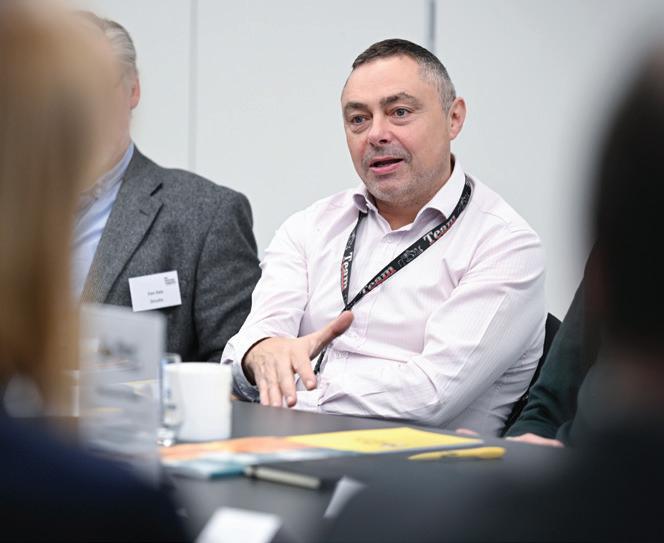
But whether in life sciences or any other long-term science-based sector, investors cannot be expected to fund the necessary infrastructure to drive progress.
A government must build and support the industrial supply chains to technological and life sciences progress.
While recognising this will require significant capital investment, a government will see payback in 10 to 20 years. Gabriele Pupo said. “We want to be able to manufacture here, in Europe or the USA rather than on the other side of the world, but we all need the right environment in which to do that.”
In 2022, the USA took significant steps to support its own industries, when President Biden signed the Inflation Reduction Act (IRA).
This offers millions of dollars in funding and incentives to accelerate the transition to a clean energy economy. Perhaps the UK should consider a similar UK IRA act to support the country’s burgeoning sector?
Last year, the USA also introduced the Biosecure Act, which seeks to prohibit federal agencies from contracting with or funding any company working with a “biotechnology company of concern”.
For UK life sciences and other technology companies looking scale in the USA, they may have to locate manufacturing facilities there rather than at home.
But that could mean knock-on positive effects for Europe as life sciences and tech companies pivot away from suppliers further afield to ones closer to home.

In the meantime, the previous UK government had a £520 million life sciences innovation manufacturing fund. This supports businesses investing in life sciences manufacturing projects in the UK.
“These are promising signs from our new government,” said Adam.
Robin Cohen, founder and CEO at aVaxziPen, agreed. “Given the size of the UK economy, I think Innovate UK do an amazing job of funding early innovation for venture capital to take over when the time is right.
“European grants are also a lifeline for many start-ups.
“I agree with Gabriel that we all need to be better at finding and working with the right investors and understanding when they want an exit so we can bring in other investors at the right time.”
Dan Daly at Occuity, added: “We’re at the early stage and have raised about £7 million or so from a fairly wide range of angel investors.”
For SugaROx, substantial support from the government has walked hand in hand with engagement from private investors, according to Bianca Forte.
“To date, we have raised £2.1 million pounds from private investors and £2.4 million pounds in grants.
“If it wasn’t for these grants, SugaROx wouldn’t be here today because when we approached a private investor in the UK, Angels or VC Funds who operate in agri tech, they considered our long time to market too risky.
“Agri-tech has long research and development cycles; in our case six to eight years were expected from the launch of SugaROx to the point where we could have a product in the market.
“We developed business plans to address the most critical questions at different stages of venture development.
By obtaining a grant to reduce risks for each cycle, we could persuade private investors who had the confidence to match the public funding.”
But Prathiba Kurupati, founder and CEO at GeneOmics Solutions, said it would be good to see more differentiation between start-ups and scale-ups in the funding environment.
“As things stand, Innovate UK put young businesses still at the early stage in the same grant funnel as those with proof of concept. This means that those further ahead are much more likely to secure grants.
“It’s like mixing up elementary school students with graduates.”
“There are some feasibility grants which are there for young companies, but there are many more industrial grants.”

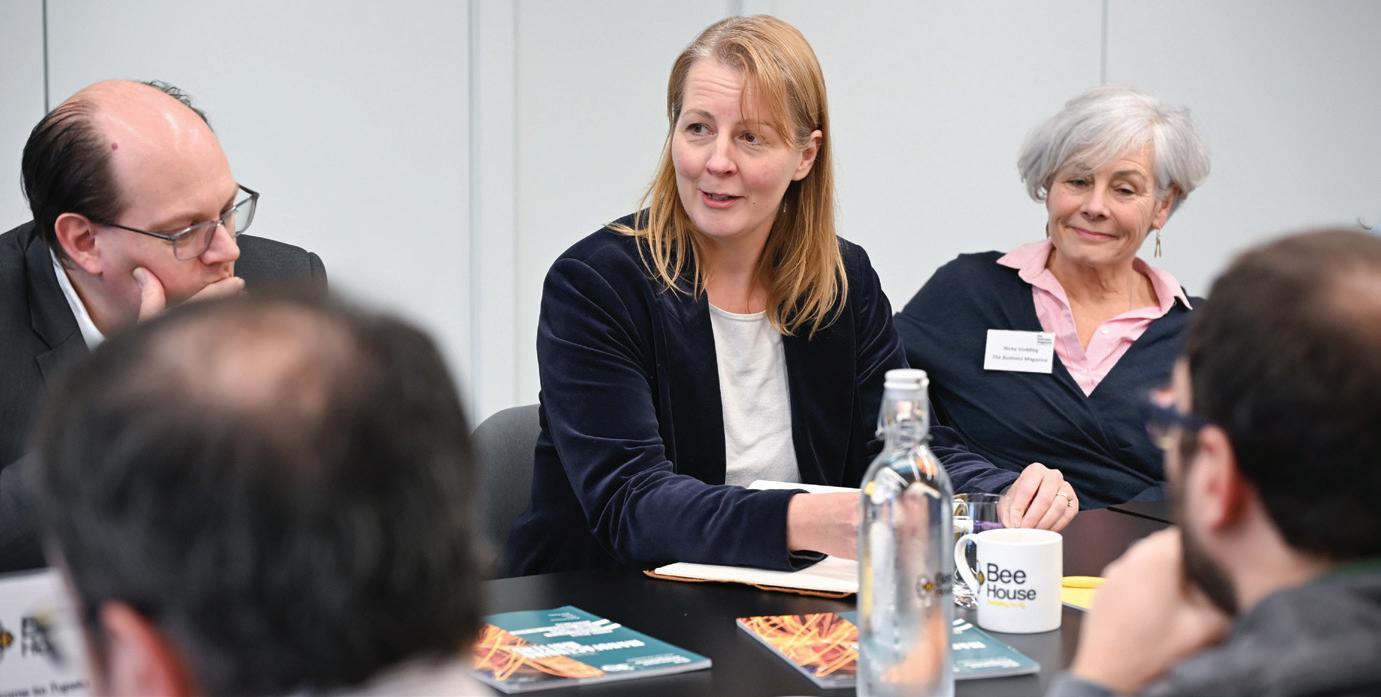
Jo Brewer, Chief Scientific Officer at Adaptimmune Therapeutics said that government support is a lot better now than it used to be.
“Adaptimmune has raised more than a billion dollars since our inception in 2000. But such is our science that it hasn’t been possible to raise enough funding in the UK so we went to the USA to undertake clinical trials, because the infrastructure wasn’t here in the UK at the time.”
“However, one of the really nice things to see is the number of start-up companies that are now being supported in the UK.
“While there is still an acknowledged death-valley of funding, more people understand that life sciences investing is a long-term game. It took us 16 years to launch our first product on the market and we still need to raise more money, so are currently undertaking a restructure to be in the best shape to raise that capital.”
Athene Blakeman, General Counsel at Oxford Science Enterprises, added: “The bit that’s missing in the UK eco system is interim liquidity that isn’t a NASDAQ IPO. It would be interesting to have an early phase of investment where seed investors


stay through to series B or C and then they can sell down to a later stage investor. There’s an erroneous perception that if early-stage investors want to sell down, the company’s not worth investing in.”
Infrastructure is very important to support young companies. Philip Campbell, Commercial Director at Milton Park, said.
“Using legislation to activate a better investment landscape into these companies, and at a real estate and infrastructure level to achieve a better planning landscape, such as the Milton Park LDO which enables 10-day planning, we can support these companies sooner. Whether that’s transport, housing, green or energy infrastructure. It all helps to create the right environment for young companies to thrive.”
The government can only do so much
The government is very happy to listen and engage with the life sciences sector, added Jo.
“But there is only so much they can do. While we have talked to them about manufacturing support often, nothing has yet come of that. However, the cell therapy
catapult has been really useful. The way they’re training people to enter the job market is a valuable contribution because these are hugely specialist roles. While attracting the right talent has got easier in terms of visa applications, getting the skills we need is always going to be challenging for any life sciences company.”
“R&D tax credits are also crucial to keeping research in the UK and we don’t intend to move this to the USA.”
OMass has raised more than £129 million from top-tier international investor syndicates including Syncona, Oxford Science Enterprises, GV, Northpond Ventures, Sanofi Ventures and British Patient Capital
Melissa Faris, its Chief Business Officer said: “R&D tax credits were very important to building the overall strategy of the company from a financial perspective and attracting US investors on top of our excellent technology and people.
“As business leaders we need to continue active involvement with the government. Having these discussions will benefit the whole of the UK, not just the life science sector.
“We have about 60 people representing more than 20 countries. So being able to have access to the right visas and continuing to attract talent, whether they’re coming straight out of universities, or coming to the UK is very important.”
Dan Daly at Occuity added: “The biggest impact for us around employment has been the changing national insurance and employment laws. This isn’t going to be easy for any small company. We also find it hard to identify skilled staff in the UK so we are also recruiting internationally.”


Athene Blakeman agreed that there is a lot of help for companies at early-stage funding levels within Innovate UK but points out that there is a gap further down the line.
If a company needs to manufacture, there is little funding available in the UK and it will need to go elsewhere.
“The Mansion House compact is fantastic in that respect because it will bring a lot more funding into the industry at all stages, however it’s going to be a long journey to see that translate into actual investment.
“But the cost of doing business in the UK is still a major issue for all companies.”
The new government has got four years to really deliver said Claus Andersen, life sciences partner at Freeth’s.
“And they know that one of the areas they can use to deliver is the life sciences sector, because it’s one of the areas that the UK is known for globally.
“The drive to create the sort of mega pension funds we see in places such as Canada and Australia is good, but will these pension funds be prepared to commit long term? The devil for these great commitments will be in the detail.
“The government’s focus on getting people off the NHS waiting lists and improving their health will see them be able to return to work. This means less need for companies to go overseas for staff, but it also needs to improve conditions for businesses.
“The R&D announcements give certainty, which is good. But more support is needed for manufacturing.”
“It all goes back to making sure that there are the right conditions to run a company and educating investors to think longer term.”

But the cost of doing business in the UK is still a major issue for all companies
Adam added: “One of the weaknesses we have in the UK is that we don’t have a credible public market for biotech companies. Most of most of our successful biotechs go public on NASDAQ, so there is that gravitational pull over to the US.”
Jason Mitchell, partner at MHA highlighted the fact that US investment in young companies often seems easier to access than in the UK.
“In terms of private equity, the companies which head to the US, or talk to our US-owned clients, seem to secure good investment more often with a much more agile process.
“While I welcome the government’s commitment to R&D tax credits, we are also seeing a lot of challenges to these credits at the moment, particularly the smaller claims, as HMRC try to crack down on fraud, where there is a perception that there has been some misuse.”
Will Richmond-Coggan, Partner at Freeths, said: “The life sciences sector, like many others, needs an apolitical strategic framework and common vision, so that investors can make financial decisions over five to 10 years and not be tied to one government term.”
But Paul Townsend at MHA said that he wasn’t convinced that pension funds will be persuaded to completely change their investment strategies over extended time frames. Many pension funds need earlier returns to meet ongoing pension

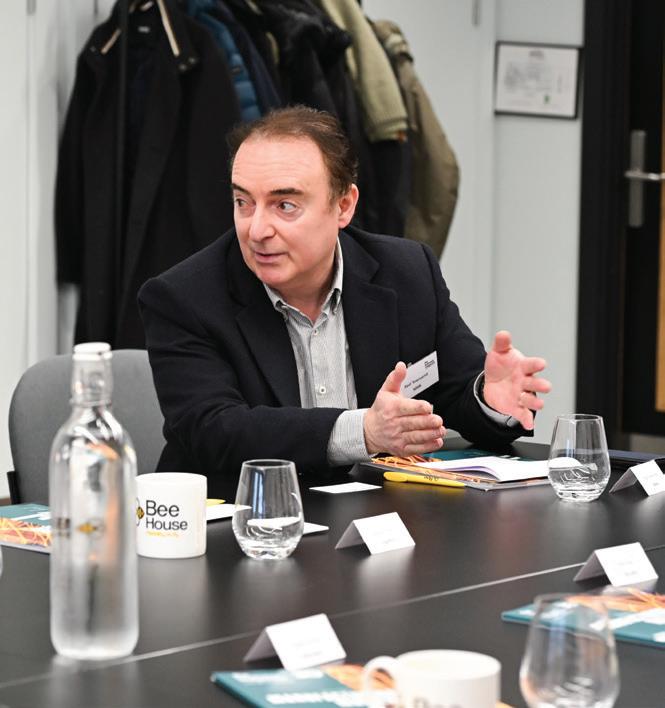
payments as well as certainty in income terms.
“And R&D tax credits have been cut back over the last five years to reduce government expenditure.
“But it is a global market for tax credits and perhaps the UK should try and be more competitive in this regard.”
Adam added: “France, Canada and Australia are more competitive, but that comes with its own problems. Companies in some of those jurisdictions can find it

difficult to fulfil global ambitions because the tax credit benefits provide such strong incentives to work with contract research organisations in those countries only, which may lack fully integrated offerings. It can be a double-edged sword.”
Bianca at SugaROx added another important point affecting the competitiveness of UK ventures in global markets. “While we want to sell into our home market first, we cannot overlook the rest of the world in terms of food production. To develop solutions for farmers abroad, we need to test our
biostimulants in the environment where they must perform. Lack of flexibility to use grant funding to run field trials in the US or Brazil, for instance, has a major impact on how quickly we can develop export opportunities.
“We find truly world-leading academic researchers in the UK. By helping spinouts explore the potential of British technologies in international markets, the UK government would see a return from its investment into fundamental science that can change the world.”

A new manufacturing facility which will produce millions of pounds worth of products annually has been officially declared open in Poole.
PBH Manufacturing has consolidated four other sites – three in Poole and one in Blandford – into the new 44,151 sq ft facility at Broom Road.
Once production is fully up to speed, manufacturing in Poole is expected to represent 50 per cent of the forecast £38 million annual turnover of its parent group, Poole Bay Holdings.
The business, founded by Martyn Bright and Mike McKenna 24 years ago, is one of the UK’s leading B2B eCommerce and
catalogue marketers and manufacturers of business products. It is better known through its multiple brands and websites including JustGloves, FirstAid4Less, SafetySigns4Less, NBB Outdoors and Koolpak.
More than 30,000 products are stocked, ranging from bicycle shelters and picnic tables to first aid supplies and medical kit.
It receives more than 300,000 orders annually.
The new manufacturing facility, which employs 70 people, was opened late last year by Bournemouth West MP Jessica Toale.
She said: “Facilities like these are so important to our local economy.
“When I speak to people about this area their immediate reaction is that it’s seaside and retirement.
“But it’s my absolute privilege to tell people about the really vibrant local economy that we have here.
“It’s companies like yours that are really pushing to make things and grow our economy in Britain.”
Mike McKenna, Chief Executive of Poole Bay Holdings, said: “This facility looks fantastic and is a credit to everyone here.
“Martyn and I started our careers in manufacturing and both of us have been very keen to develop manufacturing in the UK for some years.
“In a short while, manufacturing will represent 50 per cent of our turnover which I think is staggering.
The main head office and distribution centre for Poole Bay Holdings is at Fleets Corner Business Park in Poole.
The company employs 226 people.
The Royal Academy of Engineering, in partnership with Amazon, has awarded Amazon Future Engineer Scholarships to 15 female students from low-income backgrounds studying engineering and computer science degrees in the UK.
This year’s recipients were recognised for their dedication to creating meaningful change through technology and will each receive a financial support package of up to £20,000.
Javine Ebrubah, who is studying for a computer science degree at the University of Kent, is one of this year’s awardees. She said: “My family couldn’t afford to support me through university, and I would never expect them to, so I would struggle
financially to do a degree without this support from Amazon. Not only that, but access to mentors, like-minded students and networking groups is invaluable as I fulfil my dreams of owning my own app development company.”
Since the Amazon Future Engineers Scholarships were launched in 2021, to help address the under-representation of women studying computer science and engineering at UK universities, more than £1.25 million worth of funding has been awarded and the programme currently supports 90 women studying STEM-related degrees at universities across the UK.
Lauren Kisser, Ambassador for Amazon Future Engineer & Director, Living Room
Technology at Amazon, said: “Exceptional talent can be found right across the UK, but the tech sector risks a lack of diversity of thought if we don’t step up efforts to support students from diverse backgrounds into STEM subjects.
“At Amazon, we’re passionate about breaking down barriers to opportunity.”
Lynda Mann, Head of Education Programmes at the Royal Academy of Engineering, said: “Evidence suggests the Amazon Future Engineer Scholarships are having a real and positive impact on recipients, both in terms of their experience at university and their progression into careers in engineering and computing.”
Infleqtion, a leading quantum information company, is to expand its Oxford operations, building on a series of recent achievements that reinforce the UK’s position as a quantumenabled economy.
Through collaborations with government, academia, and industry Infleqtion is accelerating the development and deployment of quantum technologies and demonstrating the transformative impact they can have in areas like transport, energy, healthcare, security, defence, advanced manufacturing, digital technologies, finance and banking.
“Infleqtion is leading the UK’s quantum revolution,” said Tim Ballance, the tech company’s UK President. “Our work with partners across government, industry and academia demonstrates the real-world impact of quantum technology.”
To support its growth and R&D efforts, Infleqtion has relocated to a new facility in the Oxford Technology Park. The new 7,500 sq ft space will help accelerate the development of quantum technologies for national and global impact.
Infleqtion also plans to create at least 100 advanced manufacturing jobs and build a production line in the UK –with strong support from the Harwell Quantum Cluster.
EMS Physio, a third-generation family business in Wantage that produces medical supplies and was founded in 1924 is set to close.
The company said that the external

Infleqtion is already delivering a neutral atom quantum computer for the National Quantum Computing Centre (NQCC) based at Harwell Innovation Campus in Oxfordshire.
The government chose Harwell Innovation Campus to be the home of its new NQCC.
The hub and national laboratory was backed by an initial
£93 million of investment through UKRI,
economic and regulatory environment has become far more challenging in recent years, hampereing the long-term commercial viability and sustainability of the business.
In a statement, the company said: “During the past few months, we have been assessing several different options and outcomes to address these challenges.
and aims to push the boundaries of what’s possible using quantum computing technology.
The NQCC offers a 4,000 sq m building including meeting, office and laboratory spaces to host 12 quantum computers by this spring.
Currently, more than 70 people work in the NQCC.
“Unfortunately, none proved workable or realistic.
“It is therefore with great regret and sadness that EMS Physio will close, before the end of March. The actual date has yet to be finalised.”
Where possible, existing stock of EMS Physio products will continue to be sold to customers subject to availability.

As we step into the New Year, we’re excited to welcome more businesses who are ready to take their company to the next level in our thriving community.
With state-of-the-art facilities and a growing network of ambitious professionals, Lakeside North Harbour has quickly become a prime destination on the South Coast for those looking for more than just an office.

The stunning campus setting provides opportunities for brisk scenic walks around the lake, picturesque on-site cafes, and fully-equipped workspaces. Our amenities cater to a dynamic community of professionals, making Lakeside a place beyond the office.
• High-tech meeting rooms and flexible workspaces designed for creativity and collaboration
• On-site fitness facilities and wellness programs for physical and mental well-being
• Dedicated event spaces for networking, seminars, and social gatherings
• Green spaces and nature trails, perfect for a break.

A community of growth and innovation
This year we saw several new occupiers join our campus. Each new addition enriches our community, reinforcing our reputation as a place beyond the office.
• Radweb: A leading tech company bringing innovative solutions at Lakeside
• Charles Taylor: A global insurance services provider, who relocated their operations to our site
• The NHS Trust: Trust’s administrative wing creating a collaborative space for healthcare innovation
• Bournemouth University’s midwifery department: A unique addition that highlights the variety of industries that call Lakeside home
• Alexandra Sports: A new retail presence, offering specialist sports gear and expertise.
Sustainability at the heart of Lakeside We’re committed to creating a sustainable future for our businesses and the wider community. Recent initiatives include:
• Solar project: A cutting-edge initiative harnessing renewable energy to reduce our carbon footprint and support green energy solutions. (see image above of new solar panels on car parks and building roofs)
• Water saving scheme: Innovative measures to conserve water across our site, ensuring we remain an environmentally responsible business campus.

Don’t just take our word for it.
Steve Rad and James Taylor, Co-founders of Radweb
“Lakeside is the perfect location for us. It’s local to Portsmouth, making it easy to recruit students from the university. The excellent transport links also make commuting accessible for our employees, especially students who rely on public transport. This new office space represents a significant step in our business growth, allowing us to continue scaling while providing a flexible and supportive work environment.”
Dawn Taylor, Owner of Alexandra Sports
“Lakeside offers the perfect blend of convenience and opportunity for our business and enables us to tap into a vibrant and active community that aligns perfectly with our values.
“Lakeside’s flexible workspaces give us room to grow and innovate, all while staying true to our core values of customer care and community involvement. We’re also thrilled about the chance to engage in Lakeside’s wellness initiatives, like inviting brands such as Hoka for running events around the lake.”
There’s never been a better time to join us at Lakeside. Whether you’re a small team or a larger organisation, our world-class amenities, thriving community, commitment to sustainability and the resources needed to thrive are at your disposal.
For more information or to book a tour, visit www.lakesidenorthharbour.com

The Government’s proposed Modern Industrial Strategy aims to drive growth by being pro-business and pro-jobs. However, the fiscal policies announced in the Autumn Budget may mean we’re driving forward with the handbrake on.
When I was small, I woke up one day to see our neighbour’s car was parked in the living room of the house opposite. A steep drive and the poor application of a handbrake were to blame. Luckily, no one was hurt, but it demonstrates the importance of knowing which levers to pull, and when.
In October last year, the Government published its Green Paper on Industrial Strategy – Invest 2035 – describing it as “central to its number one mission of growth”. The paper raised 35 questions and invited responses from stakeholders across both the public and private sectors. Crowe contributed to those responses. The final Industrial Strategy and accompanying Sector Plans for the eight ‘growth-driving sectors’ (ranging from defence to creative industries) will be published in Spring 2025, alongside the Spending Review.
The aim is to deliver the certainty and stability businesses need to invest in the
high-growth sectors. You could argue the Autumn Budget contributed to certainty, if not stability.
On the positive side, the paper highlighted the UK’s success in attracting strong foreign direct investment, particularly for digital technology projects. The UK has the third largest tech ecosystem globally by investment. With Crowe serving more Technology and Media clients than any other sector, I was pleased to see the UK’s strengths in certain digital and creative industries highlighted, including climate tech, fintech and entertainment.
However, two significant barriers to growth were also identified: persistently low levels of private sector investment and the challenge of converting research, development and innovation into commercial opportunities. Despite our world-class research base and significant equity funding for spinouts (only the US raises more), these issues remain. The new National Wealth Fund, capitalised

with £27.8bn, is the Government’s attempt at unlocking ‘billions of pounds’ of private investment.
Whether the Industrial Strategy will positively support UK business and ultimately move the dial on growth remains to be seen. What is certain is that business leaders will ultimately be the ones to deliver the growth we desperately need, and that boils down to their own confidence, creativity and ambition. Fortunately, we have a positive entrepreneurial environment, driven not just by financial motivation, but also by a desire to contribute positively to society at a much-needed time. The UK has particular expertise in the technologies needed for Net Zero, for example.
The announced increases to CGT and Employers NIC, as well as caution on interest rates, mean the handbrake is still on for now, but if we play to our strengths and put our foot down a little bit harder, UK business can still look forward positively.
Want to accelerate your business?
Contact Mark Allen on mark.allen@crowe.co.uk to find out how Crowe can help you to make smart decisions that create lasting value.
www.crowe.co.uk

Another tightly contested Thames Valley Deals Awards saw winners announced in 14 categories that recognised the cream of the region’s dealmaking community.
Winners and finalists were applauded by a lively audience during the ceremony at Reading’s Select Car Leasing Stadium.
The category sponsors for this year’s awards were Gateley Legal, IBB Law, R3vamp, ThinCats, BDO LLP, HCR Law, Crowe UK, HMT LLP, British Business Bank, LDC and YFM Equity Partners. The supporting partners BDB Pitmans and SG Kleinwort Hambros
The high quality of submissions made judging as difficult as ever and the independent judges were thanked for their time and effort in reviewing every nomination which plays such a significant
role in the overall judging process.
This year, the independent judges were Sue Elliott at British Business Bank, Jeremy Hill at Kleinwort Hambros, Doug Edmunds at CapEQ, and Peter Jacobs at Apiary Capital.
For the Small, Mid-Range and Large Deal of the Year awards, the judges’ choices made up 70% of the vote. On the evening, the audience vote counted for the remaining 30%.
TV presenter Mark Durden-Smith presided over the awards.
During the evening guests donated over £2,000 and raised a significant sum in the Silent Auction for the supported charity, MNDA (Motor Neurone Disease Association).









PRIVATE EQUITY FIRM OF THE YEAR
JOINT WINNER: LDC
SPONSOR: HMT LLP

PRIVATE EQUITY FIRM OF THE YEAR
JOINT WINNER: YFM Equity Partners
SPONSOR: HMT LLP

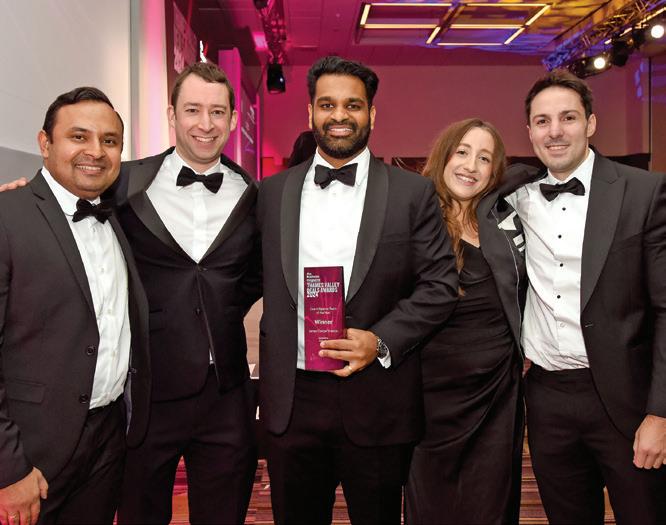
DUE DILIGENCE TEAM OF THE YEAR
WINNER: James Cowper Kreston
SPONSOR: R3vamp






CORPORATE DEAL OF THE YEAR
WINNER: Fastlane Paint and Body sale to Steer Automotive Group
SPONSOR: Deal Ticket

LAWYER OF THE YEAR
WINNER: Rachel Turner – HCR Law
SPONSOR: BDO LLP



CORPORATE FINANCE ADVISER OF THE YEAR
WINNER: Mark Allen – Crowe UK
SPONSOR: Gateley Legal


YOUNG DEALMAKER OF THE YEAR
WINNER: Laurel Knight –Gateley Legal
SPONSOR: YFM Equity Partners




CORPORATE FINANCE TEAM OF THE YEAR
WINNER: James Cowper Kreston
SPONSOR: IBB Law

LAW FIRM OF THE YEAR
WINNER: Osborne Clarke
SPONSOR: ThinCats

LENDER OF THE YEAR
WINNER: Shawbrook Bank
SPONSOR: HCR Law








SMALL DEAL OF THE YEAR (UNDER £10M)
WINNER: Psychology Tools investment by YFM Equity Partners
SPONSOR: LDC

LARGE DEAL OF THE YEAR (OVER £50M)
WINNER: NVM Private Equity sale of Pareto FM
SPONSOR: British Business Bank




DAVID MURRAY DEALMAKER OF THE YEAR
WINNER: Adam Dowdney – IBB Law
SPONSOR: The Business Magazine

LIFETIME ACHIEVEMENT AWARD
WINNER: Jonathan Caswell – LDC
SPONSOR: The Business Magazine

MID-RANGE DEAL OF THE YEAR (£10M - £50M)
WINNER: MBO of Message Direct backed by LDC
SPONSOR: Crowe UK
TO READ MORE ABOUT THE WINNERS USE THE QR CODE





OCTOBER 2024 | £43M
Utilita Bowl owner Hampshire Sport & Leisure Holdings

has been acquired by Infrastructure conglomerate GMR Group (India)
Software provider Gemba Advantage (London) OCTOBER 2024 | (UNDISCLOSED)

has been acquired by Business consultancy Actica (Surrey)
Buyside advisers include Moore Kingston Smith, HCR Law, EY, A&M
Sellside advisers include BPE Solicitors, Momentum Corporate Finance
OCTOBER 2024 | £300M
Authentication division of De La Rue (Hampshire)

is to be acquired by Security tech provider Crane NXT (US)
2024 | £57M
Managed services provider Atech Cloud (Buckinghamshire)

has been acquired by Managed services provider iomart (Scotland)
Sellside advisers include Claritas, Wilson Partners
OCTOBER 2024 | (UNDISCLOSED) OCTOBER 2024 | (UNDISCLOSED)
Kendra Energy Solutions (Buckinghamshire)

has moved to an EOT, backed by Specialist lender Shawbrook
Buyside advisers include Shoosmiths, Forvis Mazars
Shipleys LLP (Surrey)

Sellside advisers include Osborne Clarke has merged with Moore Kingston Smith LLP (London)
OCTOBER 2024 | (UNDISCLOSED)
Diamond Logistics (Surrey)

has received investment from Frontier Development Capital (West Midlands)
Marketing group TL;DR (London) OCTOBER 2024 | (UNDISCLOSED)

has formed with the backing of Chapman Capital (Dorset)
NOVEMBER 2024 | (UNDISCLOSED)
Metal supplier MG Metals (Hampshire)

has been acquired by Doré Metal Services (Kent)
Buyside advisers include Thomson Snell & Passmore, Kreston Reeves

NOVEMBER 2024 | (UNDISCLOSED) NOVEMBER 2024 | (UNDISCLOSED)
Credit risk tech firm LendingMetrics (Hampshire)

has received investment from Investor LDC (London)
Buyside advisers include FRP Corporate Finance, Womble Bond Dickinson, BDO, Armstrong Coppett Hill, Alvarez & Marsal, Aon
Sellside advisers include Sequence Advisers, RWK Goodman

has been acquired by Cohort plc (Berkshire)
Buyside advisers include Investec Bank
NOVEMBER 2024 | (UNDISCLOSED)
Software provider Proventeq (Berkshire) has received investment from Investor BGF (London)

Buyside advisers include RSM, Claritas Tax, SBR Consulting, Confidas People, Apex Group, Field Seymour Parkes, Equiteq
Sellside advisers include Trowers & Hamlins
Among the top tips and high profile failures written about mergers are estimations that as many survive as marriages – roughly 50 per cent.
Businesses are fond of declaring that their “people are their greatest asset” and that is often true. Upon a merger, completed or pending, corporate PR machines go into overdrive. Once they’ve signposted the headline commercial rationale, they announce the shared ambitions, complimentary principles, aligned values and common cultures.
Countless examples and the experiences of employees show us that while merging entities invest heavily in the optics (PR and internal communications), some stop there. Those boards, executives and investors hold their collective breath, hope that integration is smooth and that teams adapt.
Meanwhile, employees are faced with a seismic shift – new colleagues, characters, management and structure.
New policies, procedures, software and systems, an empowering, collaborative and trusting management style may yield to something more autocratic and transactional, or vice versa. Changes, which may involve saying goodbye to people and premises, can be extremely unsettling. It is too often forgotten that employees have human reactions to big changes. Productivity can be the loser.
Increased employee engagement is known to boost productivity and profitability. The ingredients of engagement are workplace-based but are clearly rooted in human needs –trust, valuing one’s work,opportunity, recognition, role clarity etc. Organisations
are getting better at listening, but it is incumbent on the leadership of merging businesses to check-in on their “greatest assets” before, during and after M&A.
Boards should insist on formal and informal information gathering, human interaction and the provision of an independent channel for employees (and other stakeholders) to share their views and concerns around any merger.
Mergers are marriages. Some need more work than others. Few survive significant impact without excellent communication with the people involved being at the very heart of the discussion.
Rory James-Duff
Orwell Independent Ltd www.orwellindependent.co.uk

There have been some interesting transactions taking place over the past two months

GMR Group goes into bat at Utilita Bowl holdings group
GMR Group (GGPL), co-owner of Indian Premier League team Delhi Capitals, is to acquire a majority stake in the company behind Utilita Bowl – the home of Hampshire Cricket.
GGPL plans to set up the venue for “longterm growth and financial sustainability” as Hampshire Cricket becomes the first English club to join an international cricket group.
Rod Bransgrove, chair of Hampshire Sport & Leisure Holdings Group, said: “This is the fulfilment of a dream for me and, I hope, for all Hampshire Cricket supporters.
“Beyond our team’s accomplishments on the field over the past 24 years, we’ve transformed our stadium into a premier test match and events venue and one of the most exceptional cricket and leisure facilities in the country.
“We’ve also been pioneers in the development of women’s cricket and have
consistently innovated throughout this relatively short history.
“We believe GGPL is the perfect organisation, with the right people, to build on our proud legacy.”
The new owners hope to enhance the multisports and leisure facilities at Utilita Bowl, including the stadium, hotel and golf course.
They’ve also pledged to further the development of Hampshire’s cricket teams and pathways.
Grandhi Kiran Kumar, corporate chair of GMR Group: “What initially attracted me to Hampshire was the way it was run by Rod, whose leadership ethos closely mirrors that of the GMR Group.
“I believe GGPL is in the best position to carry Rod’s legacy forward and continue building on the strong foundation he has established.
“With this acquisition, along with our investments in the US, Dubai, and India, GMR is focused on engaging and connecting with the global youth.
“Our vision is to transform sports into a platform that unites people and cultures, drives global excellence, and nurtures the creation of future world champions.”
Rod is set to continue as group chairman until at least September 2026, while David Mann will retain his role as CEO.
They’ll work together with GGPL to develop short, medium, and long-term strategies for growing the club and its operations.
Sittingbourne-based Doré Metal Services has acquired Southampton’s MG Metals, complementing its existing operations in Kent, Bristol and Hertfordshire with a greater presence in the South of England and Wales.
Doré is a distributor of non-ferrous metals and turned over more than £13 million last year.
Kent law firm Thomson Snell & Passmore advised Doré on the deal with a team led by Joanne Gallagher, head of corporate M&A.
She was supported by Faye Cook, Daniel Gorringe, Harry Roffey and Rachel Macmillan.
The transaction involved complex regulatory issues as well as banking and finance workstreams and was closed ahead of the autumn budget.
David Hunter, managing director of Doré Metals, said: “I’m delighted that we’ve successfully reached an agreement with the shareholders of MG Metals for a total buyout.
“Having established a longstanding and loyal relationship with MG Metals over the years, it was clear that our core business values were already aligned.
“This made the decision to join forces a straightforward one when the opportunity presented itself.”
Joanne added: “This was a really rewarding transaction to have been part of, helping Doré Metal Services bring its ambitious growth plans to fruition.
“We wish David and the rest of the team all the best as the organisation goes forward with a strengthened market offering.”
Kreston Reeves advised Doré Metals on corporate finance and accountancy matters, led by Craig Dallender.

Basingstoke-headquartered bank note giant De La Rue is selling its authentication division to New-York listed Crane NXT, Co.
De La Rue said the cash deal represented an enterprise value of £300 million, of which five per cent is to be held in escrow for up to 18 months following completion. It is currently expected that completion will be during the first half of this year.
Clive Whiley, chairman of De La Rue, said the sale represented a “substantial step forward on our route to realise the underlying intrinsic value of the De La Rue business for the benefit of all stakeholders”.
He said: “We are delighted to reach agreement with a company with the stature of Crane NXT, with its complementary
Theale-based technology group, Cohort plc, has strengthened its naval defence sector offer with the acquisition of EM Solutions.
EM Solutions is an Australian-based technology developer for innovative microwave and on-the-move radio and satellite products that help deliver high speed telecommunications for global navy and defence customers.
As part of Cohort’s growth strategy, the EM Solutions acquisition will reinforce the Group’s market position in Australasia.
Andrew Thomis, Cohort CEO, said: “The proposed acquisition of EM Solutions aligns with our strategy to accelerate growth by making

strengths and are confident that the Authentication Division will continue to build on its recent successes.”
He added that the deal’s completion would allow the firm to repay its existing revolving credit facility in full ahead of its maturity on July 1 and would provide a springboard to unlock further value as it moves to find a long-term funding solution for the group’s legacy defined benefit pension scheme.
“In addition, we will be able to focus fully on building and growing our world-leading
targeted acquisitions in the UK and overseas. Australia is an increasingly important strategic region, reflecting the increased security challenges in Southeast Asia and the Indo Pacific, and the creation of the AUKUS alliance.
“EM Solutions provides access to the fast-growing satellite communications market, further broadening the Group’s strong existing naval systems service offering, whilst bringing new customers and enhancing our position in the UK, NATO Europe, Asia and South America.
“This is our largest acquisition to date, representing Cohort’s seventh standalone business. We are looking forward to welcoming the EM Solutions team to Cohort and working together to realise the multiple growth opportunities that this transaction affords.”
By adding EM Solutions capabilities to the Group’s product portfolio, Cohort
currency business,” said Whiley.
Completion of the transaction is subject to conditions, including a reorganisation to effect a divisional separation required to deliver the division to Crane NXT on completion, and obtaining customary antitrust approvals.
The group has also agreed to pay an additional £12.5 million in deficit repair contributions to the pension scheme over the period to April 2027, further reducing the scheme’s deficit.
will enhance its Communications and Intelligence division and diversify into the growing satellite communications market.
EM Solution’s leadership team led by John Logan and Georgios Makris will remain in place and will benefit from the research, market insights and client relationships within the Group network, alongside support from locally appointed Non-Executive Directors.
The acquisition of EM Solutions follows a period of accelerated growth for Cohort which has reported strong performances in revenue, adjusted operating profit, order intake and net funds in the 2024 financial year. Following contract wins of more than £120 million since the start of the current financial year, the order book on 30 September 2024 stood at more than £559 million.

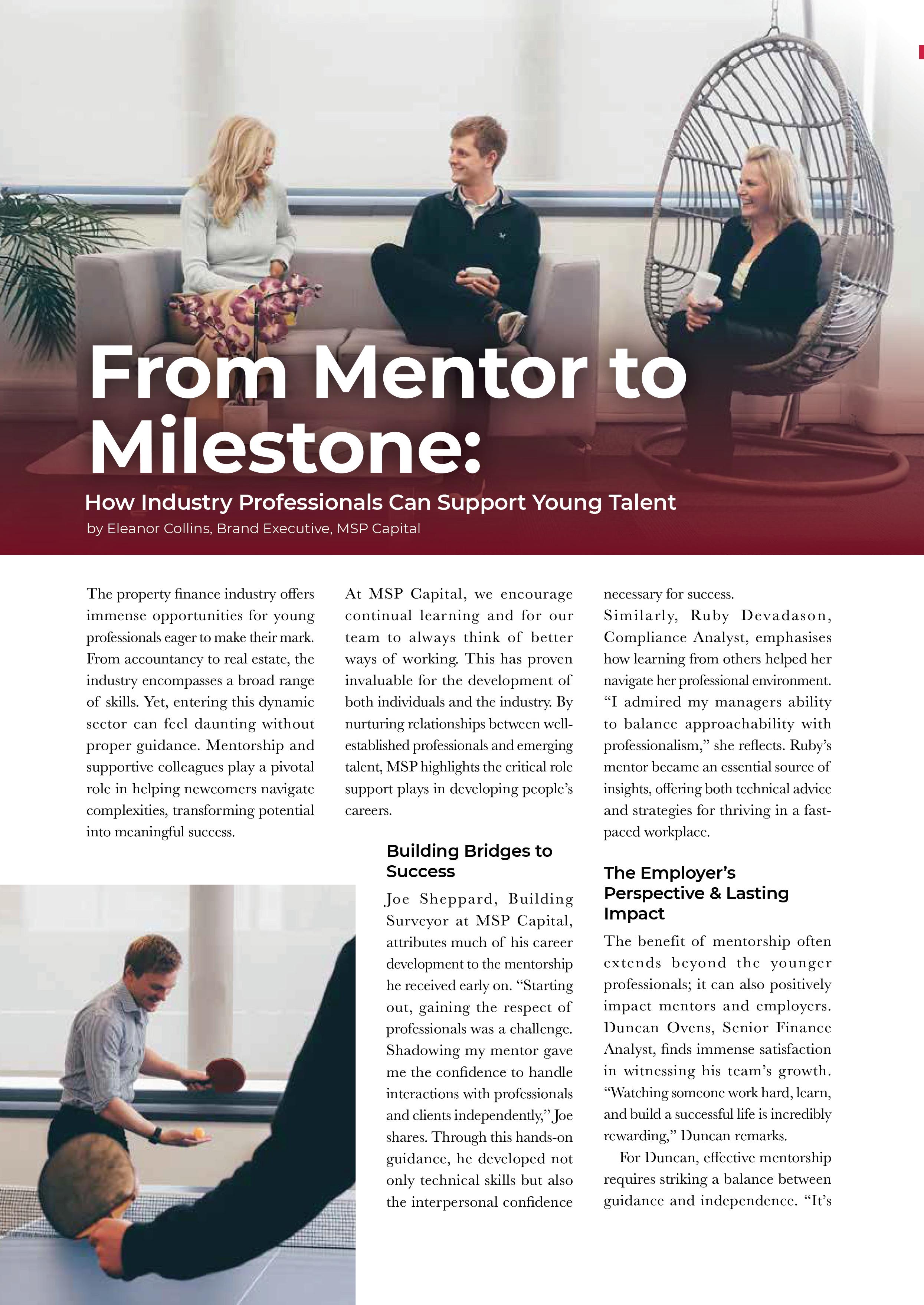


Oxford’s Fortitude Communications makes senior hire
Fortitude Communications has appointed Victoria Ward, to underpin its long-term growth plans. Victoria was previously Head of PR at London-based Charmfactory, where she represented music and entertainment clients including Universal Music and Warner Music.

New CEO at Oxford’s Scancell
Scancell, the Oxford Science Park-based developer of novel immunotherapies for treating cancer, has appointed Dr Phil L’Huillier as CEO and a member of the board. Before joining Scancell, Dr L’Huillier was CEO and managing director of CatalYm GmbH, a Germany-based pioneering cancer immunotherapy company.


03 Amazon Filters brings in sales and procurement expert
A UK process filter manufacturer has appointed a top sales and procurement expert with extensive experience of biotech engineering to lead its global pharma strategy.
Surrey based Amazon Filters has tasked Mafalda Silva with delivering a targeted international sales plan to accelerate growth while working closely with sales team colleagues, distributors, resale partners and customers. Mafalda is pictured with Sales Director Simon Hughes.
05 Moore Barlow welcomes private wealth partner
Law firm Moore Barlow has appointed Guildford-based Lewis Edwards as a partner in its private wealth practice.
Lewis brings expertise in wills, estate planning, succession planning for family businesses and tax matters.


04 Princess Anne named chancellor of Bournemouth’s new Health Sciences University
The newly rebranded Health Sciences University (HSU) – formerly AECC College – has named Princess Anne as its inaugural chancellor.
Following her installation at Corpus Christi Church in Boscombe, Dorset, the Princess Royal visited HSU’s Bournemouth campus and met with students, staff and patients.

06 Jess is fit for promotion in Christchurch
1FitLife, a Christchurch-based fitness content creation agency, has promoted Jessica Overton to managing director from account manager. The 30-year-old will also take the helm of Fitter Stock –a subsidiary, which specialises in B2B white-label fitness and wellness content.

Daniel Bastide promoted to national head of corporate at Irwin Mitchell
Daniel Bastide, a partner at law firm Irwin Mitchell’s Gatwick office, has been promoted to national Head of Corporate.
His appointment follows the recent hire of corporate partner Ute Mueller who specialises in Anglo-German mergers and acquisitions. Irwin Mitchell also recently announced that Paddy Sturman had been promoted to national head of banking and finance.

10 Alex Tatham joins CI Group as non-exec director
Alex Tatham, previously managing director and later an executive director at Thames Valley-based IT distributor Westcoast, has been appointed nonexecutive director at CI Group, a UK marketing and events agency network, which includes London PR firm Clareville.
CI Group is at the forefront of integrating artificial intelligence (AI) into its marketing strategies.


Unipart Logistics UK welcomes new MD
Mike Bristow has joined Unipart Logistics as its new UK Managing Director. Mike has a proven track record of success in leading and growing businesses.
He joins Unipart from DHL, where he served for 17 years, leaving as Managing Director. Prior to this, he held senior manager roles at both ASDA and John Lewis.

12 Gateley’s Guildford office welcomes new legal director
Gateley Legal has bolstered its South East construction offering with the appointment of legal director Maria Coker
Maria brings to the firm’s Guildford office more than 10 years of industry experience – including in-house roles with Equans and Ardmore Group – and specialises in both non-contentious and contentious construction matters.
08 New Associate joins Lester Aldridge Real Estate development team
Lester Aldridge has welcomed Shaun Webb to the firm’s Real Estate Development team in Southampton as an Associate.
With more than a decade of experience in the real estate sector, Shaun brings expertise in residential development and strategic land, which he has specialised in since 2018

11
Vail Williams recruits talent as business grows
Property consultancy Vail Williams has appointed another surveyor in response to growing business demand.
Jake Collins joined the Gatwick agency team in Crawley from Worthing-based estate agent Michael Jones, where he held a senior negotiating role.


The numbers of young people starting apprenticeships rose last year, albeit marginally. But the government’s new, flexible, growth and skills levy could boost this further
By Nicky Godding
The number of young people on apprenticeships rose slightly last year, up by just over one per cent to a total of 278,590.
Advanced apprenticeships accounted for 43 per cent of starts while 36 per cent were on higher apprenticeships.
They started, but did they finish? The latest figures on completions come from the previous year (2022-23). They reveal that just over 54 per cent successfully completed their apprenticeships. While this in an increase on the previous year, it’s still below the government’s 67 per cent target.
This year’s week-long celebration of apprenticeships bringing together businesses and apprentices runs from February 10-16
It takes place against a backdrop of welcome government changes to the much-criticised apprenticeship levy introduced in 2017 by Chancellor George Osborne.
Ever since it was introduced, the levy has
attracted widespread condemnation for being too restrictive.
Among a number of issues, businesses could only spend the levy on very specific types of training and couldn’t use the money to fund courses shorter than a year.
The levy required large organisations to set aside 0.5 per cent of their payroll for apprenticeships, and if they didn’t use the money within two years it would revert to the treasury.
But almost from the get-go, trade bodies across the UK complained that it wasn’t fit for purpose. In a letter to the previous government in January 2023, UK Hospitality, the British Retail Consortium, TechUK and the Recruitment and Employment Confederation said that a skills levy should give employers flexibility to invest in their workforce through short, modular courses and online learning.
They added that none such courses could be funded through apprenticeship levy funds, £3.5 billion of which has expired
since 2019 because businesses were unable to spend it.
However, when it got into power, and unencumbered by a commitment to previous legislation, the new Labour government announced that it would replace the apprenticeship levy with a new “flexible” Growth and Skills Levy.
This will allow funding for shorter apprenticeships, but it has yet to confirm more details.
However, it wants employers to rebalance their funding for apprenticeships to invest in younger workers.
This is also likely to mean the scrapping of funding for level 7 apprenticeships – equivalent to a master’s degree and often accessed by older or already well qualified employees, which will now sit outside the levy.
Businesses need a highly skilled workforce to draw on if they are to drive economic growth and expand opportunity in our communities
The Association of Employment and Learning Providers (AELP), the national membership body which represents training and vocational learning providers, has welcomed the reforms, but raises concerns over the cutting of level 7 apprenticeships.
AELP said that the evolution of the current apprenticeship programme, including introducing shorter foundation and midcareer apprenticeships alongside the core apprenticeship programme, means there is scope for significant growth in participation to more than half a million apprentices a year, an increase on the current participation rate of nearly 50 per cent.
It is recommending maintaining the employer-led, all-age, all-level apprenticeship programme and introducing both a foundation apprenticeship to support more young people/SME training routes and an impactful mid-career apprenticeship programme for upskilling adults.
It also suggests increasing the apprenticeship programme budget
from the levy take to facilitate new nonapprenticeship funding flexibilities as part of the commitment to reform the levy and system.
Last September, Bridget Phillipson, the Secretary of State for the Department of Education, said: “The first mission of this government is economic growth. Central to this mission is a skills system fit for the future. Businesses need a highly skilled workforce to draw on if they are to drive economic growth and expand opportunity in our communities.”
But many businesses find the qualifications landscape to be opaque.
In its first report, Skills England – the government’s new arms-length body to drive the country’s skills agenda, says that skills supply may be mismatched against demand, and there are insufficient
mechanisms for encouraging employers to invest in skills.
It also says that employer investment in training has been in steady decline over the past decade. Training expenditure is at its lowest since the introduction of the Employer Skills Survey in 2011, with investment per employee down by 19 per cent per cent in real terms.
Demand for occupations and associated skills also differs across industries. The health and social care industry has the highest volume of roles in demand. Other high demand occupations include those in the education, manufacturing and professional scientific and technical industries.
And the future skills landscape looks different again, with the impact of demographic and technology shifts, as well as the transition to more green skills.
Many of the occupations currently in demand are also those projected to see employment growth in the future, including those in health, social care and life sciences, green jobs, AI, creative industries and service-orientated roles.
Occupations requiring higher education (such as building and civil engineers) and interpersonal skills (such as youth and community workers) are expected to see the most employment growth by 2035.
Bristol and Gloucestershire waste management company Grundon hosted the company’s first-ever Grundon Graduation, celebrating successful apprentices from the past 12 months.
Managing Director Clayton SullivanWebb presented each apprentice with a certificate, personalised apprenticeship lanyard, and a bespoke Apprenticeship Graduation hi-vis as a token of their accomplishment.
He said: “Every apprentice not only passed but many passed with distinction. Grundon’s distinction rate is well above the national average.”




Leading brickwork contractor in England, employing more than 150 people. Roe takes great pride in its apprentice training scheme. It liaises with both the CITB (Construction Industry Training Board) and local colleges, to ensure the right candidates get the right support on site and off.
Leading brickwork, scaffolding and integrated façade sub-contractor. Employing more than 1,200 people and with a focus on training and development, through its Lee Marley Academy it offers career opportunities in a variety of trade, specialist and professional positions, not only for apprentices but also graduates and those with prior experience.
Lee Marley offers both brickwork and scaffolding apprenticeships to bring the next generation of tradespeople into the construction industry. It offers more than 40 places per year.


Established by local teacher Barbara Ford in 1988, Hopscotch is an independent family-run business covering Brighton & Hove and East Sussex. Over the last 18 months it has helped 18 apprentices qualify and wants to provide more apprenticeship opportunities.
Full service building services firm. Darke & Taylor has run apprenticeship schemes for more than 40 years and over that time offered jobs and training to more than 350 young school leavers looking to develop careers in the built environment.
The company has a workforce of more than 150 people, of which more than 30 are currently undertaking an apprenticeship or adult traineeship studying to become electricians, fire and security engineers, business administrators and ICT specialists.
Full service accountancy and professional services firm. James Cowper Kreston’s three-year school leaver programme offers the opportunity to combine on-the-job learning with structured, classroombased training to achieve either the AAT accounting, or ATT tax, qualification.
Leading specialist masonry trade contractor Lyons & Annoot has offered apprenticeships ever since it was established four decades ago. Through its relationship with the CITB and Building Crafts College, Stratford, as well as other colleges, it aims to ensure that the training all trade apprentices receive is relevant to the industry as well as ensuring they are skilled in their chosen trade.
The firm has been training university graduates and apprentices for nearly 20 years. Its ACCA Graduate Training Programme has evolved into a highly efficient route for the right recruits to become ACCA qualified.
Founded in 1976 by Jim and Barbara Gordon, Rockley offers sailing courses to people of all ages. The business now offers a range of watersports training and apprenticeships. All classroom lectures and water-based practical teaching take place at its Rockley Point campus on the beach at Poole.
Since the levy was introduced in 2017, John Lewis has enrolled more than 4,750 Partners on to one of its apprenticeship schemes.
From fish mongering to artificial intelligence, the Partnership has offered 66 different types of apprenticeships. In 2023 it enrolled more than 700 Partners to become apprentices and is a Top 100 employer for apprenticeships.
As well as being one of the top 100 apprenticeship employers, Kreston Reeves also received the highest score for diversity apprentices.

Five space enthusiasts have begun studying the UK’s first ever Space Systems Engineering degree apprenticeship at the University of Portsmouth.
The programme has been designed in partnership with BAE Systems Digital Intelligence to drive technological innovation.
Apprentices enrolled on the four-year course will have the opportunity to learn and develop both theoretical and practical knowledge. These include studying modules such as Space Systems Engineering and Simulation and Space Propulsion and Aircraft Dynamics, whilst

visiting locations such as BAE Systems sites in Alton and Guildford.
Students will participate in a range of projects including the Azalea programme, which is due to launch its first multi-sensor low earth orbit satellite cluster next year, alongside building an array of connections across the industry.
David, 31, is one of the first five students in the UK to have the opportunity to study the Space Systems Engineering degree apprenticeship programme. He said: “I’ve always been interested in space since a very young age but I thought I’d have to move to somewhere like America to pursue
a career in the industry. It was a big surprise to find out that the UK is fast becoming a serious player in the space sector.”
Doug Liddle, Director, Space at BAE Systems’ Digital Intelligence business, said: “Welcoming the UK’s first five Space Systems Engineering degree apprentices is a vital step to attract the next generation of talent into our growing space sector. The skills gap faced today poses a significant challenge to the future of the sector. So it’s critical that we encourage and invest in future space engineers to support the UK‘s ambition to become a space science and technology superpower and ensure we stay ahead in the New Space Age.”
Berkshire-based Xtrac, a world-leader in the design and manufacture of transmission systems for the automotive industry, celebrated winning “Employer of the Year” at the 2024 Thames Valley 250 Awards, hosted by this magazine.
Xtrac’s People and Culture Director, Kirsty Knight, said: “Highlights this year have been our strong apprenticeship programme and winning our third Princess Royal Training Award.
“Also, 15 of the 20 people who took part in our aspiring leaders programme have been promoted or started new roles. We currently have 40 of our 515 employees studying some form of apprenticeship.”
For more than 30 years, Xtrac, which is based in Thatcham, has offered apprenticeship and undergraduate training. In 2022 it opened the Xtrac Academy, providing structured training for apprentices and other staff.

ExxonMobil Fawley welcomed its latest group of recruits before Christmas, with 11 new apprentices joining the New Forestbased petrochemical complex.
The apprentices are undertaking a threeyear advanced apprenticeship (Level 3) in electrical, instrumentation or mechanical maintenance.
Their training will combine theoretical studies at Southampton College with practical learning at the UK’s largest petrochemical complex, leading to the completion of the Science Industry Maintenance Technician Apprenticeship, which includes technical qualifications in either BTEC or HNC Engineering.
Sophie (21), joined the apprenticeship programme after seeking a role in instrumentation. She is learning how to maintain, calibrate and troubleshoot the site’s operating systems.
“It’s an incredible privilege to be part of the ExxonMobil Fawley apprenticeship programme” she said.
“Being able to combine the theory I’m learning at Southampton College with invaluable on-the-job training is already helping me gain experiences that will strengthen my career.”
Each apprentice spends four days a week at college and one day alternating between on-site mentoring and health and safety training in their first year.
In the second year, they will be on site four days a week with one day at college, and by the third year, they will be on site full-time.
The ExxonMobil Fawley apprenticeship scheme, which started in 1952, has graduated more than 200 apprentices since 2005, half of which are still employed at the plant.
“We recognise the importance of investing in high-quality training to develop the next generation of engineers and technicians,” said Tom Vanderwegen, Maintenance Manager at ExxonMobil Fawley.
Witney-based web technology business Olamalu, which helps organisations work better through clever use of technology, won two apprenticeship awards in the last year.
It won the Apprenticeship Employer of the year award at the 2024 Oxfordshire Apprenticeship Awards and the South East regional IT SME Apprenticeship Employer of the Year Award 2024 at BCS, the Chartered Institute for IT.
The company said: “From the moment we started the business over 10 years ago, opening up opportunities for young people to join the technology industry has been at the heart of the way we operate.
“Getting started as a software developer is hard. Companies often only want to hire developers with a degree and several years of experience. One of the biggest upsides to building our business from the ground up is that we can craft things our way and incorporate the things that are important to us.
“We decided to follow a different path and develop our own entrylevel programme for young people. Apprenticeships form a vital part of this and it’s working.”
Half of Olamalu’s team have come through the apprenticeships route.
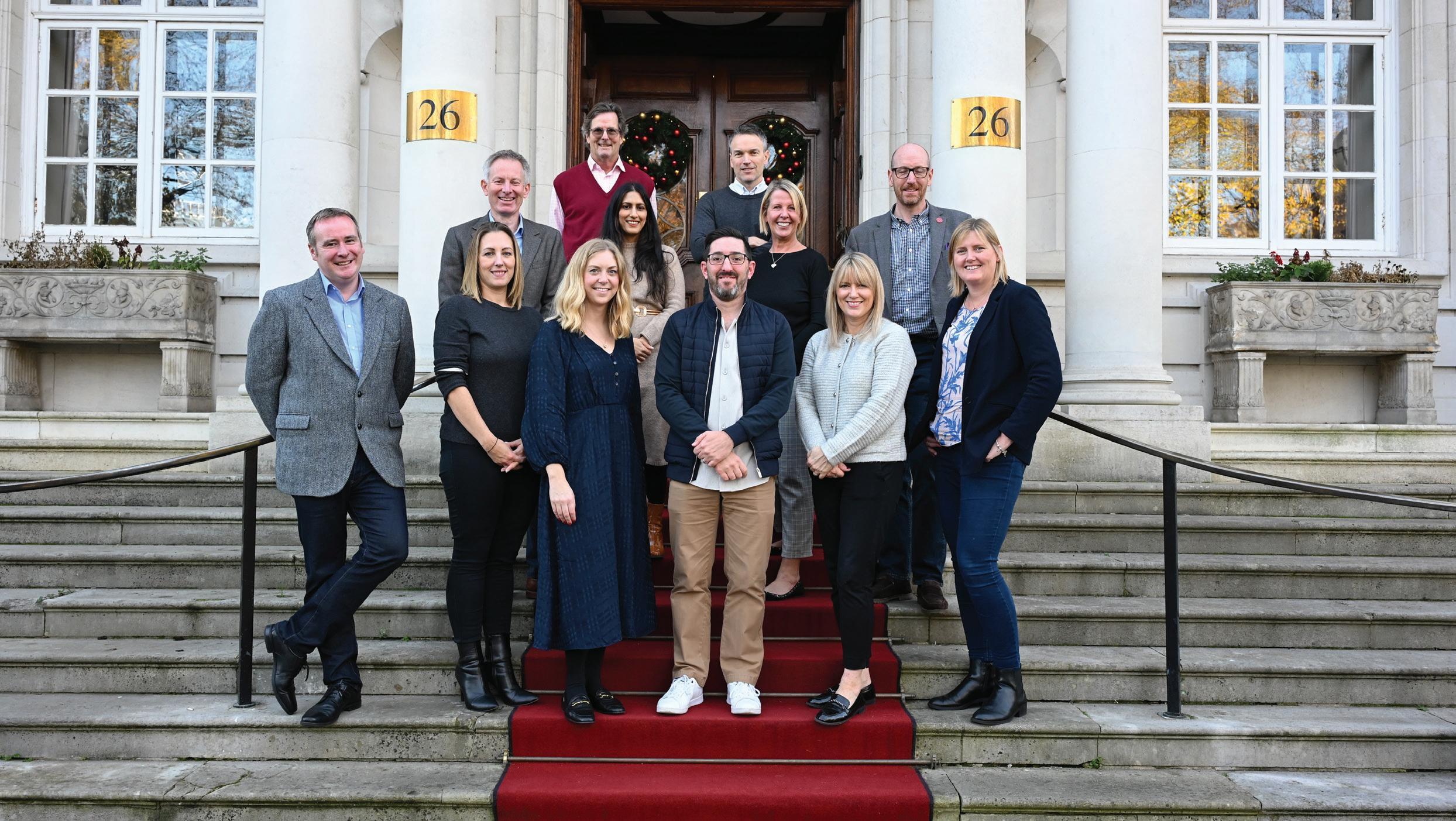

Moderator
Stephen Emerson, Managing Editor, The Business Magazine
Ruth Pappadakis, Head of People and Culture, Amazon Filters
James Ettridge, Head of People, BaxterStorey
Amanda Simon, People and Culture Director, CleanEvent Services
Bev Capewell, Head of HR, Grundon Waste Management
Kelly Gajjar, Senior Manager, Isio
Jon Gilbey, Pension and Benefits Director, Isio
James Keclik, Partner and Head of Reading office, Isio
Jen Norris, Director, Isio
Lisa Purdy, Head of HR, Macmillan Publishers International
Tom Blake, Group Head of Reward, Tullow Oil
Kirsty Knight, People and Culture Director, Xtrac
Employee benefits play a vital role in cementing company culture, retaining staff and alleviating budgetary pressures.
The Business Magazine, in partnership with reward and benefit advisers Isio, held a working lunch with human resources professionals from some of the Thames Valley’s largest companies at The Roseate in central Reading to discuss how the space is evolving.
Pension and Benefits Director at Isio, Jon Gilbey, said: “People are more likely to leave if they don’t value or understand the benefits that are on offer.
“Salary increases may be impacted because of cost pressures and one cost

effective solution to this is to make the benefits that are on offer more attractive.
“The onus is therefore increasingly on employers to make sure that the benefits are meeting the needs of their employees.”
A 2023 study by Isio and YouGov, surveying more than 7,000 UK private sector employees, found that only 23 per cent of employees felt their benefits met all their needs, with satisfaction highest among older, married White homeowners.
James Keclik, a Partner and the Head of Isio’s Reading office, said: “Workforces are diverse with diverse needs, and ethnicity was one of the biggest eye openers for us.
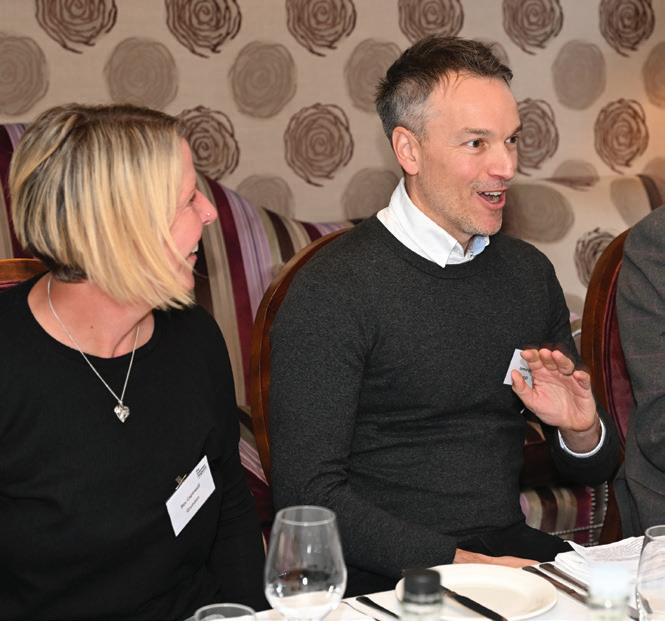

“Pensions will be one of the highest spends in your budget.”
Employee benefits can help to build your company culture and according to participants, an open approach is needed to ensure the incentives deployed are in line with what the workforce wants.
Kelly Gajjar, a Senior Manager at Isio, said: “You need to consider the things that are really important to employees and assess benefits against their needs.
“Employers can then make a plan to implement following an analysis of cost and effort of implementation, identifying some benefits which could be seen as quick wins and those that support a longer-term vision.
This point was widely agreed upon by the group, who highlighted measures they had introduced to help improve employee engagement around benefits. These ranged from employee forums to custom apps.
Beverley Capewell, Head of HR at Oxfordshire-based Grundon, said: “It’s important to get a financial person in to

really explain the benefits that you are offering to your employees.
“We have recently launched an app which is helping with employee engagement and is being used by 70 per cent of the workforce.”
Ruth Pappadakis, Head of People & Culture at Amazon Filters, said some of the best ideas the company had generated around employee benefits had come from its quarterly question time lunches.
She said: “We invite 12 people along to ask questions of the senior management during a formal lunch.
“A lot of our ideas for employee benefits have come from these lunches, including buying holidays.”
Participants said their employee forums had empowered employees and ensured that they had a role in shaping the company’s benefit package.
Kirsty Knight, People & Culture Director at Thatcham engineering firm Xtrac, said employees had been fully engaged in forums and this had helped solve some long-running issues within the workplace.
She said: “We were able to increase the holiday entitlement, improve our paternity and maternity leave provision as well as improve the on-site catering.”
“Staff also wanted more choice with their uniform provision including the colour and more workwear options, so we changed and improved the whole offering which included a range for our female employees.”
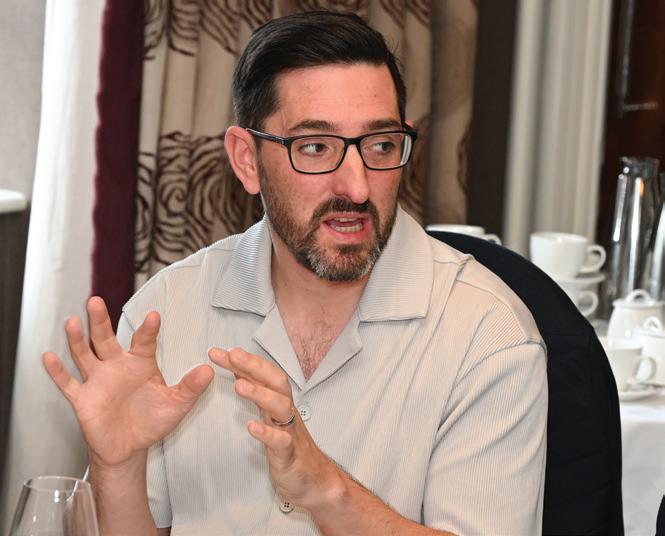
Tom Blake, Group Head of Reward at Tullow Oil, said there was a need for a flexible approach and cautioned against continually adding new benefits on top of existing ones.
He said: “Companies need to redesign their benefits for the context of what is happening in the outside world.
“Employee forums play an important role in feeding into this process as it gives the benefits process transparency and different viewpoints of matters that are affecting employees.”
The importance of keeping employee benefits fresh was also discussed and the round table praised the platforms that allow their easy switching.
Participants also said that enhanced maternity leave and floating bank holidays had been well received, particularly by employees that celebrated religious bank holidays not covered by traditional statutory days off.
The concept of providing unlimited holidays was also discussed.

Amanda Simon, People and Culture Director at High Wycombe-based contract cleaning firm CleanEvent Services, said: “We have been considering the flexibility of unlimited holidays, however I am concerned about the work that it will put on my team.”
While Tom Blake added: “A lot of American companies use this system and find that employees don’t abuse it.
“I feel it can be a bit gimmicky and not real.”
The round table agreed that there was a risk that unlimited holidays could in fact lead to employees taking less leave which could potentially have an impact on general wellbeing.
Participants also debated the positives and negatives of platforms that allow workers to access their pay early, with the consensus that it could make financial problems worse for employees.
Amanda Simon of CleanEvent Services said: “I think it just exacerbates the problem.
“It’s not that I don’t trust our employees, but everyone is struggling and I don’t want to give a facility that will make their situation worse.
“I would rather give them a benefit to help them with the weekly shop, that would actually give them a little bit more financial stability, but not give them money.”
Kelly Gajjar, a Senior Manager at Isio, floated the idea of a hardship fund that had been put in place by some companies as a means of providing relief for employees in temporary financial problems.

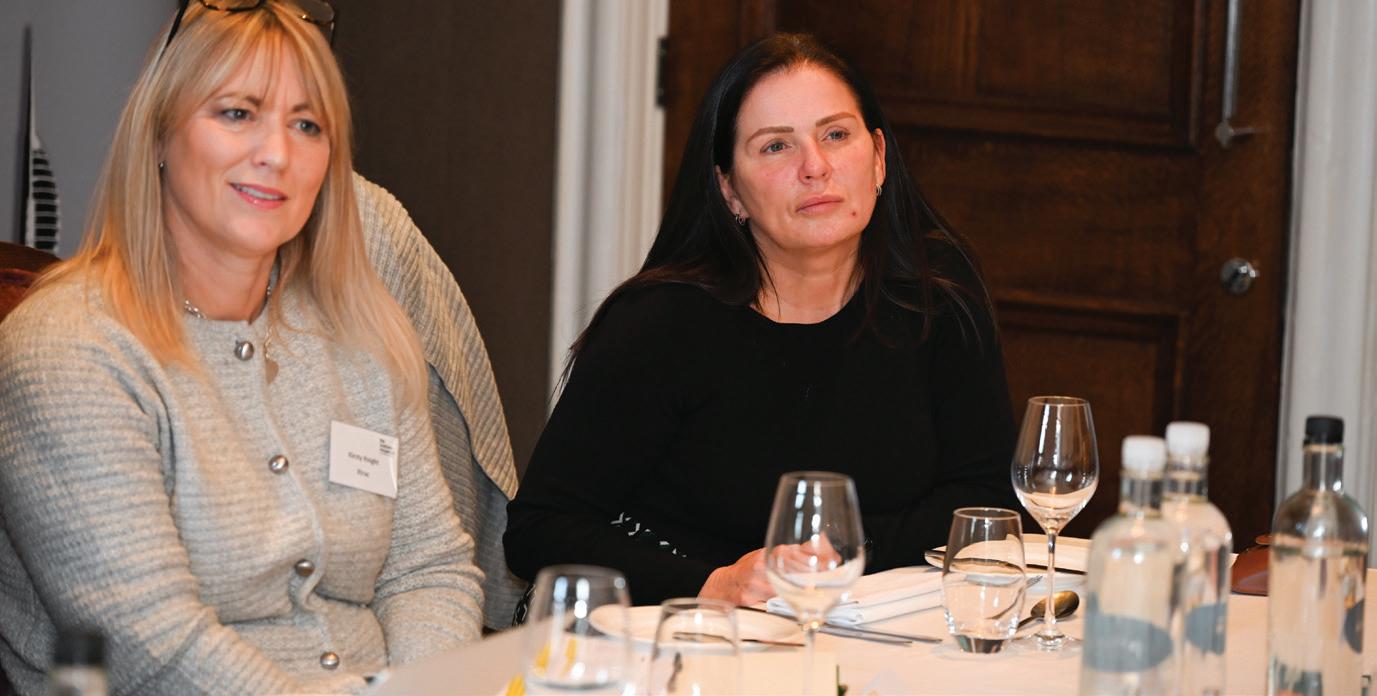
Volunteering can also help young members of their team get out and speak to people. Some are wary of how to do small talk, and this builds their confidence
Kelly said: “A hardship fund policy can work well in the right circumstances and if you have the right criteria.
“There must be a decision-making process behind why you are saying yes or no to an employee.
“You have to consider whether it is solving a problem or creating a bigger issue such as dependency.”
Participants agreed that a company’s sustainability credentials were becoming an increasingly important factor in recruitment, particularly among the younger generation.

Tom Blake cautioned that companies had to carefully examine how each part of their organisation operated to ensure that it aligned with their green messaging, especially in a social media age where investment information was easily accessible.
He said: “Firms need to look at the portfolios that they are investing in.
“Companies may say they are sustainable, but they may be investing in nonsustainable sources through pensions.”
Volunteering to help in communities was also raised as a value-for-money benefit that provided impact in the places where companies had a base.
Lisa Purdy, Head of HR for Basingstoke and Swansea at Macmillan Publishers International, said: “We do two days a year now and have partnered with a company called Community Matters Partnership.
“They arrange all our volunteering days, and we have a small group of people visiting charities to do some work at schools and other places.
“Volunteering can also help young members of their team get out and speak to people. Some are wary of how to do small talk, and this builds their confidence.

Wellbeing was also increasing in importance to employees, according to those around the table, with assistance with mental health, fitness and flexible working making their way onto the employee benefits list for companies.
James Ettridge, Head of People at Reading-headquartered catering firm BaxterStorey, said: “Support is becoming a matter of huge importance for many people, be it wellbeing or mental health support.
“This includes support for not just the individual but the family too, as these relationships impact people at work.”
James added that his company was focusing on hydration in the workplace using water bottles and electrolytes.
He said: “We’re focusing a lot on our chefs in the kitchen because they’re usually terrible at having a can of caffeinated drinks.
“We have started a trial with 600 people across our business who are going to get these water bottles electrolyzed.
“We will then conduct a before and after survey and it will be really interesting to see the results.”
Modern approaches to health were also a theme, with many employers around the table experimenting with a range of
approaches with a view to them becoming a permanent feature of their employee offering.
Tom Blake said “We are in the middle of our wellbeing fortnight. We have a different theme every day.
“It is covering meditation, reflexology and mental health to name but a few.”
James Ettridge of BaxterStorey said his firm had blood tests available that employees could send off to check for health issues.
He said: “This helps to flag up issues and reduces absences across the business.
“A few of our managers have done it and found out that their cholesterol was really high. They have since made some major life changes.”
Salary sacrifice schemes can also benefit employers by reducing costs paid in National Insurance Contributions because their contribution is calculated based on the employee’s gross salary after the salary sacrifice deduction.
The CBI noted that many businesses might need to reduce job numbers or scale back investments due to the £25 billion tax hike.
Amanda Simon said: “With the increase in National Insurance, the value of benefits
is only going to become more important.
“If costs are going up then pressures are going to come and that is why it is going to become even more important to understand your workforce and their motivations.”
Marking employee milestones was also highlighted as a key benefit that helped to bolster employee morale and embed cultural values within organisations.
Kirsty Knight of Xtrac created a recognition scheme which recognised employees that excelled in the company’s behaviours.
She said: “We have our spotlight individual, and team awards every quarter where anyone can nominate a winner.”
“These are all linked to our company values and behaviours and the nomination must bring to life how they have excelled in them.”
Kirsty said she had also developed a new recognition programme which recognised employee’s employment milestones.
She said: “For us it’s really important, we very much communicate key milestones in our company publicly, so we can thank them for their contributions.”
The lunch concluded with a message that it was vital that employee benefits were reviewed to remain relevant so that they create value for companies and retain staff. How relevant are your employee benefits?


YASA Motion’s planned new development at Bicester Motion

Bicester Motion, the 444-acre former RAF base which is fast turning itself into a unique estate for all things automotive (and many aerial) has secured a nearly £27 million development loan from Cain International, an alternative asset manager specialising in real estate.
The funding will be used to deliver the first phase of The Ranges, the Oxfordshire estate’s latest development designed for headquarters buildings for innovative transport technology companies.
Phase 1 comprises the new 90,000 sq ft headquarters for Mercedes-Benz Group-owned YASA, which began life as an Oxford University spin-out developing electric drive technology.
Practical completion is targeted for this summer, with YASA’s fit-out to follow, and teams to relocate in early 2026.
The Ranges’ remaining four buildings, planned specifically for future mobility design, light manufacturing, research and development, will be part of phase 2.
John Bentley, Chief Financial Officer at Bicester Motion, said: “This funding enables us to support YASA’s growth plans, adding their 400-strong staff team to our thriving community.
“Cain International has been supportive in providing us with development funding and has the capacity to increase its commitment as we continue to deliver our masterplan.”
Nikos Yerolemou-Ennsgraber, Director at Cain International, added: “Bicester Motion is a unique destination where, from our very first visit, the passion for motorsport and advanced engineering was immediately clear.
“We’re proud to have established a new finance partnership with the Bicester Motion team as part of our ongoing strategy to support borrowers with longterm financing solutions.
“We look forward to seeing YASA’s new headquarters at The Ranges come to life and continuing our partnership.”
Real estate giant Hammerson snaps up remaining stake in Southampton’s Westquay
Hammerson, the urban real estate operator and development giant, has bought the remaining 50 per cent stake in Southampton shopping hub Westquay for £135 million, to be paid for from the disposal of its stake in Value Retail.
It gives the firm a 100 per cent interest in a leading retail and leisure destination on the south coast, which is ‘A’ rated by Green Street, Hammerson said in a statement.
Rita-Rose Gagne, CEO of Hammerson, said: “This transaction is in line with our stated strategy.
“Combined with our recently enhanced funding position and disciplined approach to capital allocation, we are well placed to deliver growth and value creation.”
Westquay sits near Southampton High Street, in an affluent and growing catchment area by both population and employment.
It has 94,400 sq m of internal lettable area and attracts more than 17 million visitors a year.

Gunwharf Quays
Gunwharf Quays owner Landsec has submitted a planning application to Portsmouth City Council for the next phase of its £45 million investment in Central Square.
This marks the third stage of the development, aimed at enhancing the all-day experience at the waterfront outlet.
Central Square is the point of arrival for visitors and connects key areas such as The Waterfront and The Avenues. As part of the plan, the former Eden nightclub space will be converted into a dining destination, adding to the outlet’s food and beverage options.
Yvonne Clay, centre director, said: “This submission marks another key step in our long-term investment in Gunwharf Quays.
“We’re focused on enhancing Gunwharf Quays so it remains an attractive place for people to visit and helps us bring even more of the best brands and dining experiences for guests to enjoy.
“Through these plans, alongside our continued sustainability efforts and strong local partnerships, we can continue to create value for Portsmouth’s people, economy and surrounding environment.”
Pending approval, construction will begin this spring.

New Reading Gaol owner outlines plans for former prison
The owner of a historic prison has revealed plans to transform the venue.
Channing Bi said he hopes to turn Reading Prison into a hotel, museum and art gallery.
The Chinese businessman, who bought the site from the Ministry of Justice for £7 million last January, estimates the project could cost about £100 million.
Some areas of the prison are Grade II listed but Mr Bi said if Reading Borough Council granted planning permission, the work could be finished in just two years.
Mr Bi, who founded the Ziran Education Foundation, said he has other business interests that will help “to support this project” financially.
He said it will not require a loan and the costs would not be offset by building flats on any part of the site.
The prison, built in 1844, has been empty for more than 10 years.
When talking about what inspired him to purchase the prison Mr Bi said: “The prison’s history makes me think that freedom is very important.”
Oscar Wilde spent two years at the jail after being convicted in 1895 of gross indecency - effectively for being gay.
In 2021, a portrait by celebrated street artist Banksy appeared on a prison wall. The image showed a prisoner escaping on a rope made of bedsheets tied to a typewriter.
Mr Bi said “of course” the work by Banksy will stay.
He said: “I know the painting is very important, and the meaning for me is very, very useful, and gave me some ideas.
“People need freedom and I think it will stay a long, long time in Reading.”

Willmott Dixon has been chosen by Oxfordshire Country Council to build a sustainable new headquarters building at Speedwell House in the city.
The council is relocating from its current premises at County Hall in Oxford.
Ahead of the move, Willmott Dixon will extend and redevelop Speedwell House to create a 5,200 sq m “net zero in operation” office.
Following the council’s move, its former County Hall home will be sold as part of the regeneration of the city centre’s West End’
A mixed-use hospitality complex in St Leonards-on-Sea, East Sussex has gone on the market.
The Sussex Exchange, on Queensway, three and a half miles from Hastings town centre, opened around 12 years ago and has been home to a restaurant, bar, conference centre and cinema. More recently, there has also been a nightclub.
Last year it was reported that the operator of the building had gone into liquidation and the building is now vacant.
The complex, which spans more than 840 sq m, was developed by the economic development company Sea Change Sussex and opened in 2012.
It is spread over two floors, with large outdoor terraces, and has panoramic views over the ancient woodland of the Marline Valley.
Cllr Liz Leffman, leader of Oxfordshire County Council, said: “We believe that our decisions at County Hall and Speedwell House will improve the delivery of services and help with the physical, social and economic regeneration of Oxford. We will use the move to stimulate this ambitious thinking for the city and the county as a whole.”
Richard Poulter, Managing Director for Willmott Dixon in the South said: ““We recently completed a series of decarbonisation projects for Oxford City Council at four leisure centres: Ferry Leisure Centre, Leys Pool and Leisure Centre, Barton Leisure Centre, and Hinksey Outdoor Pool. We’ll be taking the skills and learning from here to Speedwell House.”


Surrey County Council’s former headquarters has been sold to luxury property developers, with permission granted for 292 new homes on the site.
London Square has bought the former County Hall in Kingston from RER London at an undisclosed price, after it was listed earlier in the year.
The 5.2-acre site includes the main Grade II listed County Hall and a range of other buildings and courtyard areas.
Adam Lawrence, London Square’s

chief executive, said: “Once restored and converted into elegant homes, County Hall Kingston will become a unique offering for those looking to make this sought-after royal borough their home.”
Construction boards surrounding the property say future residents can expect to move in from 2027.
Planning permission is already in place for 256 private flats, as well as 36 for affordable housing, and 47,447 sq ft of commercial space.
The freehold of an 0.53 acre site with planning permission for 230 residential units in central Croydon is up for sale. London-headquartered Watling Real Estate has been instructed to sell the development opportunity at Edridge Road, formerly occupied by offices.
The site is currently occupied by NCP as temporary car park, producing an income of £67,200 per annum, on a management agreement which has now expired but negotiations are underway for a new shortterm licence.
Andrew Foster and Chris Walker of Watling Real Estate have been appointed LPA Receivers, with Jamie Lamond and Tom Colyer in Watling’s London office leading the sale process.
Jamie said: “The detailed planning permission is for a part 33 storey, part 11 storey, development providing the 230 residential units, plus a residents’ gym, communal roof terraces and amenity spaces.
“The proposed development consists of 100 one-bedroom, 78 two-bedroom and 53 three-bedroom apartments, with 43 units to be allocated for social housing within the 11 storey block.”
The agreed scheme for the site will see two co-joined towers linked by a shared ground floor with two separate entrances.
Welbeck CP and development manager Coplan Estates have gained consent for an 80,000-sq ft office hub in Portsmouth to be occupied by the government’s tax agency HM Revenue and Customs.
No1 The Goodsyard, named to reflect the site’s proximity to Portsmouth and Southsea railway station, will redevelop
the former Matalan car park on Station Street as a four-storey office hub.
The Matalan store closed in 2023 when it moved to a new site at The Pompey retail park.
As well as re-invigorating the site, the proposals will provide a new public square.


Ahead of the move, Willmott Dixon will extend and redevelop Speedwell House to create a 5,200 sq m “net zero in operation” office.
The second annual Hampshire Business Awards celebrated the outstanding achievements of businesses from across the county.
Following the council’s move, its former County Hall home will be sold as part of the regeneration of the city centre’s West End’
Richard Poulter, Managing Director for Willmott Dixon in the South said: ““We recently completed a series of decarbonisation projects for Oxford City Council at four leisure centres: Ferry Leisure Centre, Leys Pool and Leisure Centre, Barton Leisure Centre, and Hinksey Outdoor Pool. We’ll be taking the skills and learning from here to Speedwell House.”
There was a lively atmosphere at the Farnborough International Exhibition & Conference Centre with 370 guests enjoying dinner and applauding winners across 16 award categories.
Welcoming everyone to the event, Nick Adams-King, Leader of Hampshire County Council, said that as a businessman, he understood the challenges and rewards of running your own company. “It’s wonderful to see so many businesses here tonight. Hampshire is home to some brilliant world-leading companies and plays a pivotal role in driving the UK’s economy,” he said.
A mixed-use hospitality complex in St Leonards-on-Sea, East Sussex has gone on the market.
The breadth of entries and finalists was highlighted by the huge response from many fantastic companies. The finalists ranged from the latest start-ups and successful companies scaling up through to well-established ‘veterans’ in their sector.
The Sussex Exchange, on Queensway, three and a half miles from Hastings town centre, opened around 12 years ago and has been home to a restaurant, bar, conference centre and cinema. More recently, there has also been a nightclub.
Supporting Partners were Farnborough International, Lainston House, Farnborough College of Technology, Hampshire Chamber of Commerce, University of Winchester, Aviator Hotel, Rootquotient and Solent University

Last year it was reported that the operator of the building had gone into liquidation and the building is now vacant.
The complex, which spans more than 840 sq m, was developed by the economic development company Sea Change Sussex and opened in 2012.
The awards were supported by Hampshire County Council and headline sponsor Farnborough Airport, as well as category sponsors Gulfstream, Associated British Ports, Herrington Carmichael, Milestone Infrastructure, Menzies, Gracelands, Barratt Redrow PLC and Utilita
The all-important independent judges, who had the difficult task of deciding on the winners, were Natasha Dochniak from Hampshire Fare; Sarah Marshall from Farnborough International; Nigel Harper from Harpers for Growth; Teresa Hogsbjerg from Hampshire County Council and Joe Jeffers from Hambledon Vineyard.
It is spread over two floors, with large outdoor terraces, and has panoramic views over the ancient woodland of the Marline Valley.

During the evening, guests raised a significant sum for the event’s nominated charity, Hampshire & Isle of Wight Air Ambulance
Overseeing proceedings and entertaining the audience was media entrepreneur, writer and performer Cally Beaton

GROWTH COMPANY OF THE YEAR
WINNER: CV-Library
PRESENTED BY: Harpers for Growth

EQUALITY, INCLUSIVITY & DIVERSITY INITIATIVE AWARD
WINNER: National Oceanography Centre
SPONSOR: Milestone Infrastructure


CONTRIBUTION TO THE COMMUNITY AWARD
WINNER: Herrington Carmichael LLP
SPONSOR: Associated British Ports


NEW BUSINESS OF THE YEAR
WINNER: VapeGuardian
PRESENTED BY: Hampshire County Council

MADE IN HAMPSHIRE AWARD
WINNER: John Pipe International
PRESENTED BY: Farnborough International

TECHNOLOGY INNOVATION AWARD
WINNER: Tomato Energy
PRESENTED BY: RootQuotient


SUSTAINABLE GREEN INVESTMENT AWARD
WINNER: New Milton Sand & Ballast
SPONSOR: Barratt Redrow plc

NOT-FOR-PROFIT OF THE YEAR
WINNER: Munch CIC
SPONSOR: Gracelands

YOUNG BUSINESS PERSON OF THE YEAR
WINNER: Will Harrigan –River Coffee Roasters
SPONSOR: Farnborough Airport


COMMITMENT TO EDUCATION, TRAINING & SKILLS AWARD
WINNER: Parmenter Forge
SPONSOR: Gulfstream


TASTE OF HAMPSHIRE AWARD
WINNER: Isle of Wight Tomatoes
PRESENTED BY: Hampshire Fare

HOSPITALITY BUSINESS OF THE YEAR
WINNER: The Parlour Tearoom
SPONSOR: Sightline

TECH COMPANY OF THE YEAR
WINNER: TEKEVER
SPONSOR: Utilita


BEST PLACE TO WORK AWARD
WINNER: Paris Smith
SPONSOR: The Business Magazine

HAMPSHIRE BUSINESS OF THE YEAR (UNDER 20 EMPLOYEES)
WINNER: BB Merchant Services
SPONSOR: Menzies LLP




ENTREPRENEUR OF THE YEAR
WINNER: Rob Collard – Collard Group
SPONSOR: Herrington Carmichael LLP

HAMPSHIRE BUSINESS OF THE YEAR (OVER 20 EMPLOYEES)
WINNER: LeMieux
SPONSOR: Menzies LLP

TO READ MORE ABOUT THE WINNERS USE THE QR CODE

IN A CHRISTMAS CAROL, NOVELIST CHARLES DICKENS EXHORTS US TO HONOUR CHRISTMAS IN OUR HEARTS AND TRY TO KEEP IT ALL THE YEAR, AND BARRATT DAVID WILSON HOMES’ SOUTHAMPTON DIVISION IS DEDICATED TO SUPPORTING THE PEOPLE AND COMMUNITIES WHERE IT’S BUILDING TAKES THAT SPIRIT TO HEART. FROM THE HUNDREDS OF HOURS ITS EMPLOYEES DEDICATE TO VOLUNTEERING, TO ITS CHARITY FUNDRAISING, TO THIS YEAR’S CHRISTMAS CAMPAIGNS, BARRATT TAKES ITS RESPONSIBILITIES TO OTHERS VERY SERIOUSLY.
A spirit of community runs through everything Barratt does, and this includes encouraging its employees to help others.
“All Barratt employees can take two days a year on full pay that they can dedicate to volunteering time with worthy projects in the community,” said Tamsin Nichols, Marketing Co-ordinator at Barratt’s Southampton division.
“We’re really proud of everyone who gives up their time to help others. Colleagues have allocated their volunteering days to all sorts of activities, from painting drop-in centres for food banks and mental health charities to supporting community exercise classes for older people and much more. In total, our teams have dedicated over 540 hours to volunteering this year.”
Barratt is aware that giving their time to others helps its employees build their own confidence too. “Volunteering is about putting yourself in others’ shoes,” said Tamsin. “It’s about getting that sense of belonging, forging new relationships and gaining valuable skills. And of course, it’s always a great experience.”
Every year, Barratt David Wilson Homes Southampton Division nominates two charities that it will support across Dorset, West Sussex, Hampshire and the Isle of Wight. This year’s good causes are Home-Start Portsmouth, a local community network that helps equip families with young children with the skills, confidence and strength they need to nurture their children, and Heartbeat, which helps babies, children and adults diagnosed with congenital and cardiovascular diseases, supporting the work of the Wessex Cardiac Unit based at Southampton General Hospital.

In September, Barratt and Heartbeat teamed up to deliver Heartbeat’s Cycle Sportive event, now in its eighth year. Cyclists were able to choose either a 70- or 40-mile route through the beautiful Test Valley, finishing in the beautiful grounds of Embley School, Romsey. Cycle Sportives are long-distance, organised cycling events – the cycling equivalent of running a marathon –which involve completing a set route of up to 150 miles. They are designed to test all-round biking skills rather than flat-out speed and are a great way for riders to enjoy the camaraderie and thrill of being part of a larger group.



This year’s event, which raised £9,500 for Heartbeat, was the first joint venture with Heartbeat after it was named as the developer’s chosen charity for the year 2024/25. Megan Hamlyn, Marketing Manager at Barratt’s Southampton division, who took on the 40-mile ride, said: “This was one of the most challenging things I have ever done but, seeing the great work the charity does, and having personally met several people who have benefitted from Heartbeat’s amazing support, I wanted to help raise much-needed funds for them.”
Tina Richardson, Head of Operations at Heartbeat, said: “There was a great turnout on the day and thanks to Barratt we were able to raise an amazing £9,500 for Heartbeat. The money raised will make a huge amount of difference to us and we are so grateful for Barratt’s and everyone’s support.”
There are many smaller charities, clubs, schools and other worthy causes supported by Barratt through its Community Fund, a dedicated financial resource that donates £18,000 per year to help local causes that improve the quality of life for people living in the region. Projects range from funding a primary school’s fireworks display to supporting an animal shelter.
In total, the housebuilder’s Southampton division has raised £341,518 for charity in 2024.
Christmas is a time when many of us try to help others less fortunate than ourselves, and this year Barratt David Wilson Homes Southampton Division is focusing on good deeds throughout the communities where it operates. To encourage a little competitive edge, all head office

departments will compete with each other, and the person who does the most good deeds will be rewarded.
“Our Christmas campaign this year is really simple,” said Tamsin Nichols. “We’re encouraging all our employees to do good deeds. This can be anything from reading stories to residents in a care home to helping someone cross the road. Whether the good deed is big or small, we’ll put it on our leaderboard and when the scores are totted up, we will recognise both the winning individual and their team.”
The developer will also be collaborating with Home-Start Portsmouth to deliver hampers and care packages to those who need them most this Christmas, as well as helping Hayling Island Holiday Lunches, a charity that delivers food to nearly 100 needy families during the school holidays.



Before the pandemic, only around one in eight working adults said they worked from home.
During Covid, everybody who could work from home was told to.
According to government data, those regularly working from home now hovers between 25 per cent and 40 per cent of the population.
If you need fast, Southampton has the fastest average download speeds of anywhere in the UK, with average speeds of 166.677Mbps.
It’s also by the seaside and hosts the UK’s biggest annual boat show.
Homeworking is here to stay. But if you want to work from home (or work closer to where you live rather than spend hours standing by the toilets on a rail commute into your company’s smart city headquarters), where is the best place to live in this region?


A bustling waterfront and pretty town centre where the main street closes to pesky traffic on Saturdays so that the locals and visitors can shop safely. And it’s close enough to the New Forest for weekend strolls.


Named in last year’s Sunday Times’ best places to live. In 2020 Farnham was the first town in England and only the third region in Europe to be given ‘World Craft City’ status. Apparently Farnham and the surrounding countryside is home to an astonishing number of craft makers. Other European holders of the designation include the Outer Hebrides for Harris tweed and the Danish island of Bornholm, famous for its glass production and pottery using locally worked clay.
What other town of this size in England has an historic cathedral, school and castle (built by William the Conqeror no less). If you love history, Winchester’s the place for you.
The castle is home to King Arthur’s Round Table too (if you believe the mythology).


We couldn’t leave Oxford out of this list. Home to one of the world’s oldest and most prestigious universities, this city has culture and architecture in spades, and it’s easily explored on foot, bike or bus.

A town on a beautiful riverside location and the annual regatta (if you love messing about on boats), brings the place alive. There’s also Henley Festival – more formal than many other festivals around the UK, but great if you’re into black tie events.


Who wouldn’t want to live in Brighton. The beach, the arts and culture, the pier… and a direct route to London if you really need to pop back to the city.


It’s home to Europe’s largest natural harbour. The town has a rich maritime history which is steeped in its old town and quayside.

The town’s charm, food and culture is clear, and The Pantiles is a beautifully preserved Georgian colonnade in the centre.
And if it’s good enough for royalty, (the town was given the prefix “Royal” in 1909 by King Edward VII to honour its popularity with the royal family, including his mother, Queen Victoria), it’s good enough for us.
A true market town (and the name derives from the River Thame which flows to the north of the town), with wide shopping streets, this semi-rural market town has ancient medieval buildings alongside Georgian and Victorian architecture.
Thame was granted a market charter in 1215 and markets have been held here on a Tuesday ever since.



We support and celebrate regional business: From start-ups to scale-ups, SMEs to large corporates and all the professional companies and people who support them.
Our regular, and growing events calendar throughout the year attracts hundreds of businesspeople to network, enjoy the region’s vibrant business community and identify opportunities for growth.
Our events are supported by this magazine, published bi-monthly, and our daily news website.
To get involved in The Business Magazine events programme, through participation, sponsorship – or if you just want to know more, please get in touch.

Jo Whittle Operations Director Jo.whittle@thebusinessmagazine.co.uk
Events team events@thebusinessmagazine.co.uk

Thames Valley Tech Forum: Networking drinks
Date: January 28, 6–8pm Venue: Malmaison, Reading

Roundtable: How SMEs can plan for growth over the next decade
Date: February 26, 10am Venue: MHA, Maidenhead
thebusinessmagazine.co.uk








South East edition: Oxfordshire & Thames Valley Berkshire & Buckinghamshire Surrey, Kent & Sussex Solent & South Coast
South West & West Midlands edition: Bristol & Bath, Gloucestershire, Worcestershire & Hereford, Coventry & Warwickshire, Swindon & North Wiltshire
Editorial
Editor Nicky Godding nicky.godding@thebusinessmagazine.co.uk
Senior Reporter Daniel Face daniel.face@thebusinessmagazine.co.uk
The region’s most influential B2B magazine, in print and online for news, features, interviews and business sector analysis.
2025 Print issues will be published in January, March, May, July, September and November
Managing Editor Stephen Emerson stephen.emerson@thebusinessmagazine.co.uk
Operations Director Jo Whittle jo.whittle@thebusinessmagazine.co.uk
Research & Rankings
Researcher Laura Clarke laura.clarke@thebusinessmagazine.co.uk
Events
Events Executive Lauren McCarron lauren.mccarron@thebusinessmagazine.co.uk
Events Assistant Katie Jackson katie.jackson@thebusinessmagazine.co.uk
Marketing
Digital Marketing Scott Whittle scott.whittle@thebusinessmagazine.co.uk
Commercial
Head of Client Relations Peter Laurie Thames Valley peter.laurie@thebusinessmagazine.co.uk
Business Manager Alan Lindstrom South Coast alan.lindstrom@thebusinessmagazine.co.uk
Business Development Owen Thomas Manager South West owen.thomas@thebusinessmagazine.co.uk & West Midlands
Production Manager Steve Banbury steve.banbury@thebusinessmagazine.co.uk
Events events@thebusinessmagazine.co.uk
Accounts finance@thebusinessmagazine.co.uk
General Enquiries editorial@thebusinessmagazine.co.uk
– Company
The Manson Group I www.mansongroup.co.uk


